#fyodor dostoyevsky analysis
Explore tagged Tumblr posts
Text
NIKOLAI ANALYSIS!!!! also some Fyolai analysis
To talk about Nikolai, the first thing about him that should be talked about is his views on freedom
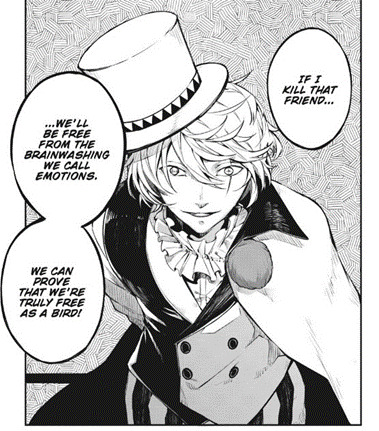
What Nikolai is meant to represent is that there are no limits for humans, that humans can do anything, cruel or good things, humans can do it, what Nikolai thinks is that there is no such thing as ‘no human could be capable of killing their friend’ or that ‘no human is capable to be free’, because for Nikolai what the society thinks and puts limits to what a human can do or can’t is being in a cage. The limits being the consequences to crimes, and thoughts being what society thinks of someone, the judgement. That’s where his comparison comes from, a bird in a cage is what humans are, and a bird out of the cage is something that humans most of the times don’t dare to.
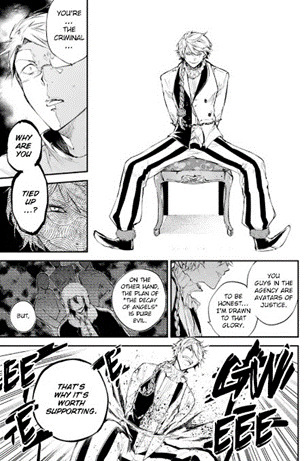
(ignore the quality pls)
Even though he is drawn to justice, he still chooses to support the DOA because of the evil in it, as I said before, he wants to prove that there are no limits for humans, humans can do and are capable of making very cruel things, however most of the people don’t do that because of the fear to consequences and because of morality, being why Nikolai says that it is brainwashing, because it is imposed since someone is very young, which leads that when people are older, they have that morality, being a gray, white or even sometimes black morality, it doesn’t matter because those people still have that morality imposed by society, it is imposed by family, schools and even friends.
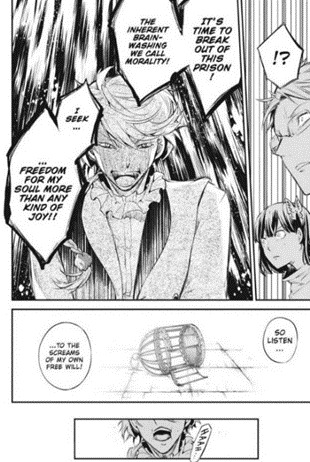
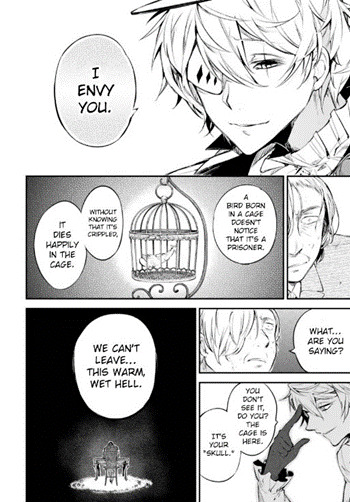
Nikolai says that the cage is the skull, the logic behind it is that in the skull the brain and everything else comes to work together, the brain thinks of things even though you don’t want to think that, the brain is responsible for everything in your body, and therefore the skull is the cage, the skull is a cage for everyone, and the only way that someone ends up being free is being dead, once you die you don’t have to worry about anything at all, you cant move, you cant think, you are alone once you die because once you die everything is black for you, which is equal as freedom.
His quote “we can’t leave that warm, wet hell” refers to the body and brain.
Let’s go now to the second topic and how it is very related to the first one.
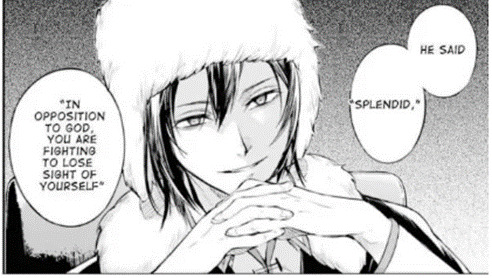
This may seem like it is not related to freedom, however for Nikolai, freedom truly is when you don’t have to think about morality, when you don’t have feelings attached to morality, when you don’t have anything attached to morality, that’s truly freedom for him, however how is it related to losing yourself? Nikolai doesn’t want to be limited to what society thinks, however he is, he isn’t free yet and he cant be totally free when he is alive, that’s why he opposes to God as a scream to be free and fights to lose himself, he doesn’t want to be limited by his personality and become predictable, what Nikolai wishes is to not be able to feel guilty at all, that’s part of the freedom he wants and considers, he wants to be able to have different thoughts, commit crimes and do things considered as unthinkable by society without being able to feel guilt.
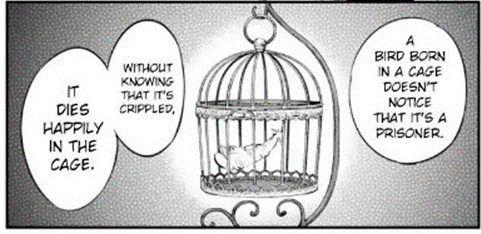
It’s more than obvious that he wishes to not be aware of the cage he is in, birds die not knowing the freedom they could have had, not knowing that they are prisoners living in a cage; that’s what he wishes and why he is jealous of Tonan, Tonan is not aware that he is in a cage, he would die not knowing that he is a prisoner, dying happily inside of the cage, never being free at all.
Let’s go to his other philosophical way to think.
What do I think his philosophical way to think is? Absurdist.
The best way to be free would be dying, committing suicide, however Albert Camus thought that the act of escaping our lives does not counter the absurd and rather in the act of ending our lives, our lives become only more absurd, how does this connect to Nikolai’s mentality?
Nikolai knows that ending our lives would be the most easy way to be free, however it would also not prove what he wants to prove, becoming the act of suicide a absurd thing, which is why he ends up not dying, the plan was for him to really be killed, however he escapes to prove what he wants, that a human can do ‘unthinkable’ things to become free, that a human can do anything, there is no limit
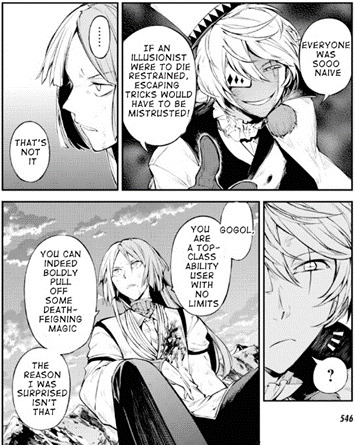
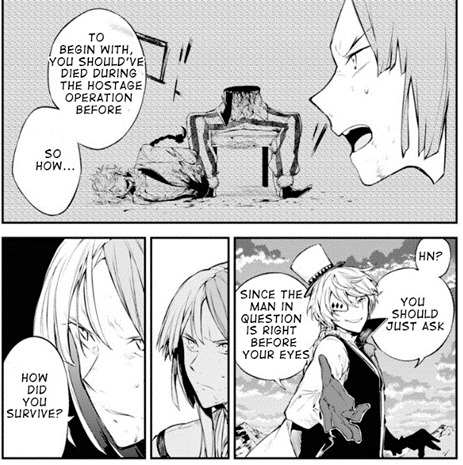
Let’s go now to his relationship with Fyodor because it is very mischaracterized, the topics about fyolai will be; Nikolai’s obsession and wish to kill Fyodor, how Fyodor does NOT care for Nikolai and doesn’t see him as an equal.
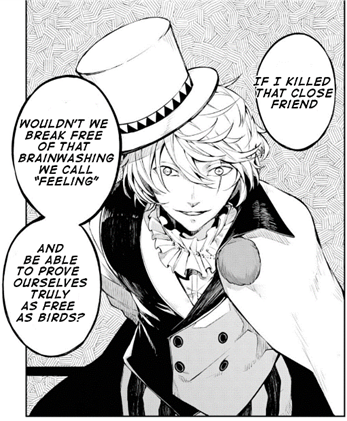
His obsession with Fyodor comes from feeling misunderstood, then he meets Fyodor and Fyodor is the first person to understand him, then, Nikolai comes to a realization, that if he wants to be truly free he has to kill Fyodor. To show what humans are capable of, to try to not feel so guilty when killing, to be free and fight what society thinks and imposes. A common thing I’ve seen is that a lot of people think that he wants to be free from all emotions, but I don’t think so, I think that he only wants to be free from guilt, from morals and from society itself. About Fyodor, Fyodor understands Nikolai because he is very smart and analyses people very good, however he doesn’t see Nikolai as his equal, his only ‘equal’ is that man and Dazai, and Dazai isn’t totally his equal since Dazai could be very much said that he is an atheist and an ability user.
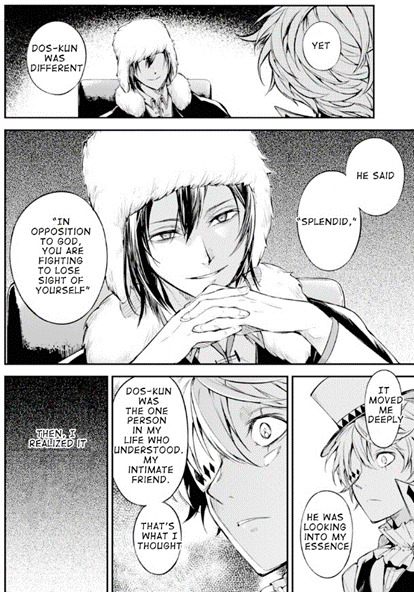
The chapter 111.5 was truly a very good show of how Fyodor does not care for Nikolai, even BEFORE this chapter got out it was OBVIOUS that he didn’t care about Nikolai, he uses them for his own benefit, as a matter of fact he doesn’t even trust Nikolai, I don’t blame him because how are you going to trust them if they tried to kill you, however the most easy way for Fyodor to get out of Meursault would have been asking Nikolai to bring him back to Yokohama or wherever he wanted to go next instead of going to the helicopter with a vampire driving. Show that Fyodor doesn’t care about Nikolai is the disinterest he shows to Nikolai, he seems disinterested and is only interested when Dazai could die too, Nikolai seems very happy however Fyodor doesn’t even look interested, in the chapter 111.5 Nikolai seems sad at Fyodor wanting to kill him too, and I don’t blame them either since Fyodor was the first person to them to understand them, and Nikolai seemed very excited to see Fyodor again, and its just sad Fyodor’s reaction because it is totally disinterested.
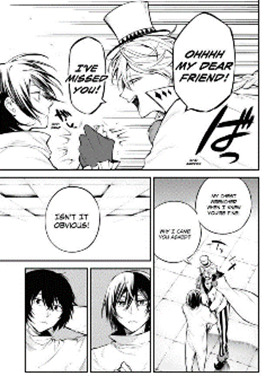
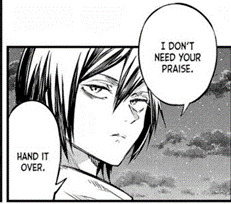
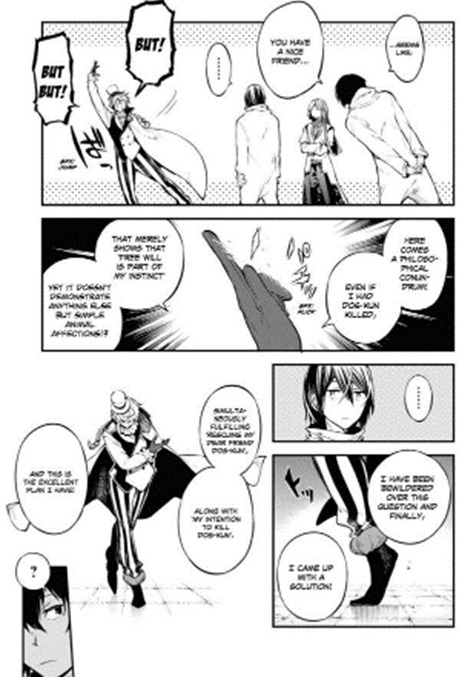
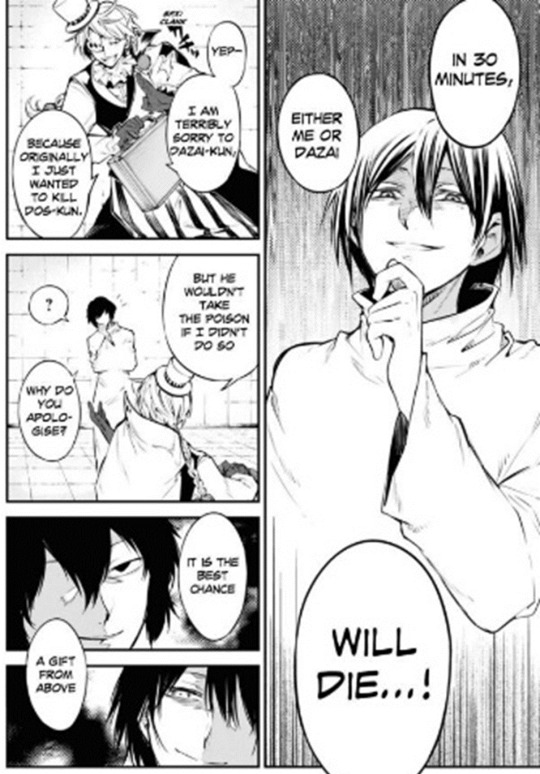
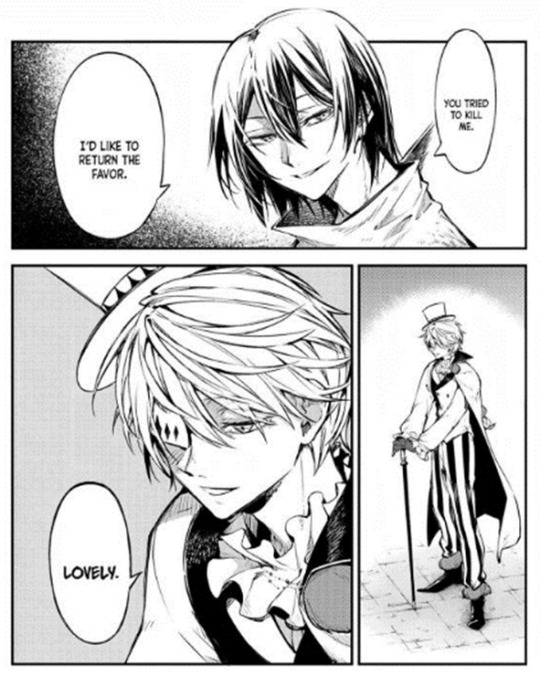
Fyodor doesn’t see Nikolai as an equal despite what a lot of people think, Fyodor sees God as his superior, then he is below God as he is God-sent, and the only equals he has or had was that man mentioned and Dazai. Dazai despite probably being an atheist and also being a ability user, he is on the same level of intelligence as Fyodor, they are both very similar despite that, and therefore Fyodor considers him as an equal but not God-sent. Then, there are sinners, which are people without an ability and are below Fyodor, then finally there are the worst kind of people for Fyodor, which are even more sinners that the people without the ability which are the ability users, and therefore he doesn’t consider Nikolai as his equal, remember that someone ‘worthy’ doesn’t instantly mean equal, and I don’t even think Fyodor sees Nikolai as a worthy ‘opponent’, I genuinely think that Fyodor sees Nikolas only as an opponent, though not worthy enough to be an equal.
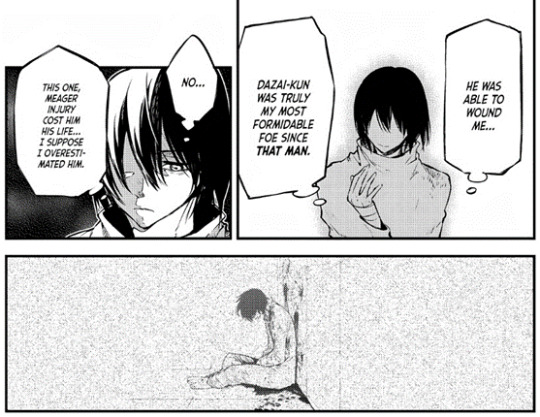
Thank you for reading my analysis!
#nikolai analysis#bsd analysis#bsd#bungou stray dogs#fyodor dostoyevsky analysis#fyolai#fyodor dostoyevsky#nikolai gogol#idk how to tag#i also posted this on tiktok#btw I do not ship fyolai#fyolai analysis#guys fyodor is alive#trust#mykola hohol#bsd fyodor dostoevsky#bsd fyodor#literary stray dogs#bsd nikolai#bsd nikolai gogol
80 notes
·
View notes
Text
I love how the bsd fandom was celebrating chuuyas birthday being happy, joyful, a bit of angsty JUST yesterday and then fyodor just comes to ruin the party like that one auntie that no one of the family likes.
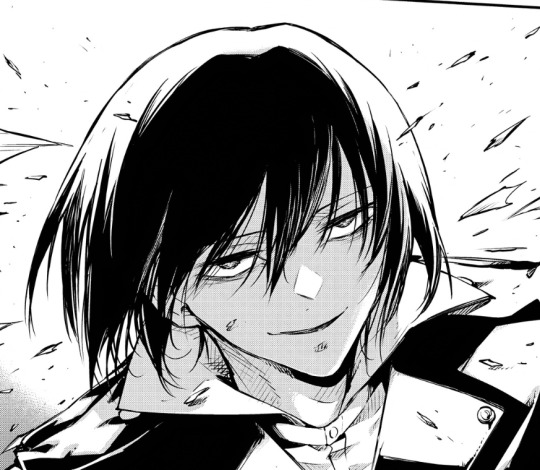
#Why does he still look kinda...#😘😘😳😳#OLAY GUYS DONT HATE ON ME-#hes just silly guys#bsd chapter 114 spoilers#Bsd chapter 115#bsd new chapter#Bsd#Bsd manga#bungou stray dogs#bungou stray dogs fyodor#bsd fandom#bungo stray dogs#bungou gay dogs#bsd x reader#dazai x reader#dazai#Dazai Osama#bungou sd#bungou stray dogs angst#Bungou stray dogs anime#bsd spoilers#bsd manga spoilers#bsd theories#bsd memes#bsd analysis#Bsd fyodor#fyodor dostoyevsky bsd#fyodor bsd#bungou stray dogs x reader
1K notes
·
View notes
Text
Bungo stray dogs fans will really watch a character get cut in half, drowned, shot in the head, blown up and have characters prepare for another character's funeral and be like i wonder how they survived because they couldn't have possibly died.
#not even IF#but HOW#and thats not even the crazist part#the craziest part is that we're always right#bungo stray dogs#bsd theory#bsd analysis#bsd anime#bsd manga#anime and manga#manga#bsd chuuya#chuuya nakahara#bungo stray dogs chuuya#bsd dazai#dazai osamu#dazai being dazai#bungo stray dogs dazai#bsd fyodor#fyodor dostoevsky#fyodor dostoyevsky bsd#bungou stray dogs fyodor#bsd akutagawa#akutagawa ryuunosuke#bungo stray dogs akutagawa#bsd higuchi#higuchi ichiyo#bsd nikolai#nikolai gogol#mypo)t
954 notes
·
View notes
Text
BSD MEN AND MBTI TYPES [+ their darlings]

So, I’m not sure how many are aware of what MBTI is, but I got a few requests on making an analysis about this for BSD MEN and incorporating their ideal type! darlings’ MBTI types as well, so I did. (I kind of promised that I would do it, so now is the time.)❤️
I want you to know, it wasn’t intentional to place one type as the ideal match for multiple characters. I thought it through thoroughly and did my best to remain as logical and diverse in MBTI types as possible. It’s just that strong Fe users are often a good match for broken people and…well…BSD men are mostly broken.
Here is a brief explanation what MBTI and cognitive functions are, for those who are not familiar with it. If you are familiar with it, you can simply skip to the next paragraph under the thinner cut.❤️

Explanation MBTI: The Myers-Briggs Type Indicator (MBTI) is a tool used to understand different personality types based on how people prefer to interact with the world and make decisions. Created by Isabel Briggs Myers and Katharine Cook Briggs, it’s based on ideas from Carl Jung about how people think and behave. MBTI types are 16 four-letter combinations such as INFP or ESTP, that are designed with each 4 primary cognitive functions that are being used frequently by each person. There are 8 cognitive functions, and we all use all of them, however, 4 are always the most comfortable and prominent.
Detailed Explanation of Cognitive Functions: Cognitive functions are specific mental processes that shape how we understand and interact with the world. Each function has a particular role and works in conjunction with others to influence personality. Here’s a closer look at each of the eight cognitive functions:
1. Extraverted Sensing (Se): This function involves focusing on the present moment and taking in information through the senses. People who rely on Se are very aware of their surroundings and enjoy engaging with their environment actively. They tend to live in the moment and respond to immediate sensory experiences.
2. Introverted Sensing (Si): Si involves recalling past experiences and using that information to understand the present. People with strong Si focus on details and how things have been done before. They rely on their memories and internal impressions to make sense of the world.
3. Extraverted Intuition (Ne): Ne is about exploring possibilities and seeing connections between different ideas. Those who use Ne are good at brainstorming and considering multiple potential outcomes. They enjoy thinking about future possibilities and spotting patterns that aren’t immediately obvious.
4. Introverted Intuition (Ni): Ni involves forming insights and understanding future implications based on internal reflections. People with dominant Ni often have a clear vision of how things might unfold and focus on long-term outcomes and deep, conceptual understandings.
5. Extraverted Thinking (Te): This function focuses on organizing and structuring the external world based on logic and efficiency. People who use Te prioritize objective criteria and practical solutions, often seeking to improve systems and achieve measurable results.
6. Introverted Thinking (Ti): Ti involves analyzing and refining ideas based on internal logic. Individuals with strong Ti prefer to understand concepts deeply and develop their own internal frameworks for how things should work. They value precision and consistency in their thoughts.
7. Extraverted Feeling (Fe): Fe is concerned with understanding and responding to the emotions and needs of others. People with strong Fe are focused on creating harmony in their social environments and are sensitive to the feelings of those around them. They often work to ensure that everyone’s needs are met and that social interactions are smooth.
8. Introverted Feeling (Fi): Fi involves making decisions based on personal values and internal emotional responses. Those with dominant Fi focus on staying true to their own principles and beliefs. They prioritize authenticity and personal integrity, making choices that align with their internal values.
Each MBTI personality type has a specific hierarchy of these functions. The dominant function is the primary way a person interacts with the world, while the auxiliary function supports it. The tertiary function is less developed, and the inferior function is the least developed and often a source of stress or growth.

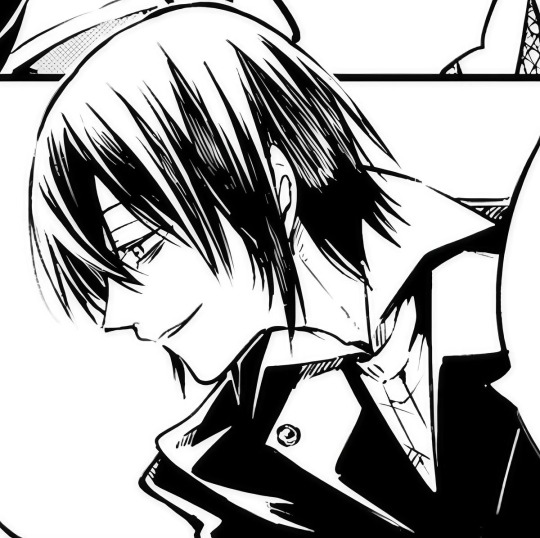
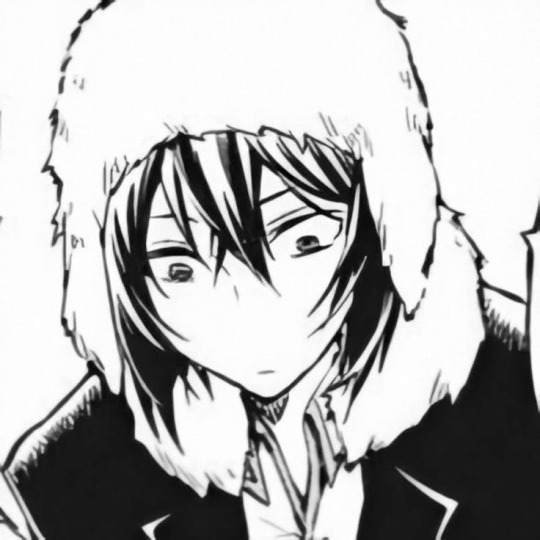
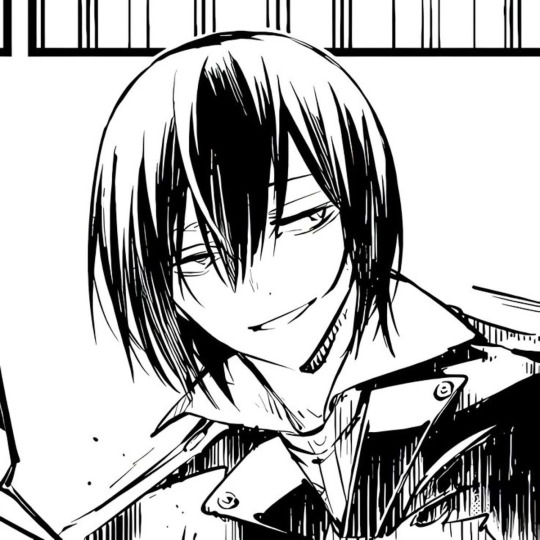
FYODOR DOSTOEVSKY
INTJ (The Mastermind/Architect) - Ni > Te > Fi > Se
Fyodor's dominant function, Introverted Intuition (Ni), reveals itself in his visionary, long-term thinking and his deep strategic foresight. Fyodor operates on a plane that transcends the immediate and the obvious.
He sees patterns, connections, and the potential outcomes of his actions far into the future, often perceiving the world in ways that others simply cannot comprehend.
His overarching goal—to cleanse humanity of its sins—demonstrates a profound understanding of abstract concepts and an almost prophetic ability to see beyond the present, traits quintessential to a dominant Ni user.
Next, we have Extroverted Thinking (Te), Fyodor's auxiliary function, which he employs with ruthless efficiency. His actions are driven by a need to impose order and structure on the chaotic world around him, aligning perfectly with Te's desire for effectiveness and productivity.
Fyodor’s methods, while morally ambiguous, are meticulously planned and executed with precision. This function supports his Ni visions, allowing him to implement his grand schemes with logical, calculated steps.
His ability to manipulate people and situations to his advantage is a direct result of Te’s influence, prioritizing objective outcomes over personal feelings.
His tertiary function, Introverted Feeling (Fi), is less overt but still crucial to understanding his character.
While Fyodor presents a cold, calculating exterior, his actions are ultimately guided by an internal value system—no matter how warped it might seem.
Fyodor's Fi manifests in his unwavering belief in his mission and his disdain for those who fail to meet his moral standards. He perceives himself as a savior of humanity, driven by an intrinsic sense of right and wrong that only he truly understands.
This Fi also explains why Fyodor is so selective about who he allows into his inner world. A potential darling, for instance, would need to align with his deeply held values, reinforcing the notion that Fyodor’s emotional connections are reserved for those who resonate with his internal compass.
Lastly, Fyodor’s inferior function, Extroverted Sensing (Se), is the least developed, manifesting in his apparent disconnection from the physical world.
Unlike characters who thrive on sensory experiences, Fyodor often appears aloof and detached from his surroundings. His focus on abstract ideas over tangible realities suggests a discomfort with Se.
He surrounds himself with serene and controlled environments—places where sensory overload is minimized, and he can concentrate on his internal visions. This discomfort with the physical world further isolates him, reinforcing his preference for solitude and reflection.
In conclusion, Fyodor embodies the traits of an INTJ through his dominant Ni, which allows him to see far-reaching possibilities and plan accordingly; his auxiliary Te, which drives his strategic actions and manipulations; his tertiary Fi, which shapes his personal values and judgments; and his inferior Se, which leads to a disconnect from the immediate physical world.
These cognitive functions, taken together, explain his complex and morally ambiguous character, as well as his potential preferences in a partner—someone who would understand and complement his internal world without disrupting the carefully constructed order he seeks to maintain.
His darling: INFP - Fi > Ne > Si > Te
or INFJ - Ni > Fe > Ti > Se
INFP (The Mediator / Idealist):
In the intricate labyrinth of Fyodor’s mind, where Introverted Intuition (Ni) reigns supreme (this sounds so serious lmao), an INFP female darling would offer an unparalleled balance and harmony.
Her dominant function, Introverted Feeling (Fi), would resonate deeply with Fyodor's own Fi, albeit in a more developed and nuanced form.
While Fyodor’s Fi is selective, almost reclusive, it is this very selectiveness that makes an INFP’s Fi the perfect match. She possesses an intrinsic moral compass, one that is authentic and unwavering, but unlike Fyodor’s, it is deeply empathetic.
Her Fi would draw out the softer, more vulnerable aspects of his tertiary Fi, helping to humanize the rigid internal values that guide his every move.
The INFP’s Extroverted Intuition (Ne), her auxiliary function, would offer Fyodor something he might not even realize he craves—a partner who can perceive multiple possibilities and ideas without being constrained by rigid logic or efficiency.
Her Ne would inject a sense of wonder and exploration into Fyodor’s meticulously controlled world. Unlike the ruthless precision of his Te, her Ne is imaginative, often seeing potential in areas Fyodor’s Ni might overlook (seriously, this man would NEVER overlook anything but let’s stick to that for the narrative).
This openness to possibility would challenge Fyodor, gently encouraging him to see beyond his single-minded visions, adding layers of depth to his already profound insights.
Furthermore, the INFP’s Introverted Sensing (Si) as a tertiary function would provide a subtle, yet grounding influence on Fyodor.
While Fyodor’s inferior Se leaves him disconnected from the physical world, the INFP’s Si, though not dominant, would allow her to appreciate the simple, sensory experiences of life.
She could offer Fyodor a gentle introduction to these experiences, helping him connect, even briefly, with the present moment. Her Si would serve as a quiet anchor, providing stability without overwhelming his discomfort with Se.
Lastly, her Extroverted Thinking (Te) as an inferior function would ensure that while she respects Fyodor’s logical and structured approach, she would not challenge his authority or disrupt the order he values so highly. Instead, her Te would emerge in moments when practicality is required, complementing Fyodor’s own Te without competing with it.
This would create a dynamic where she supports his strategies and plans, but with a gentle touch that allows his Te to dominate, thus preserving the balance of power in the relationship.
In conclusion, an INFP female darling would not only complement Fyodor’s complex INTJ personality but would also provide a much-needed counterbalance to his intensity.
Her Fi would resonate with his, but with a warmth and empathy that could soften his cold, calculating exterior. Her Ne would challenge and expand his Ni, offering new perspectives and possibilities.
Her Si would ground him, even if only slightly, in the present moment, while her inferior Te would respect and subtly support his strategic dominance.
Together, they would form a partnership where his visionary goals are met with understanding, warmth, and a touch of whimsy—qualities that, in the end, may be precisely what Fyodor needs, even if he cannot fully articulate it.
INFJ (The Advocate/Counselor):
An INFJ female darling would be the second-best match for Fyodor, harmonizing with his complex, enigmatic nature while still offering a dynamic that enriches his inner world.
As an INFJ, her dominant function, Introverted Intuition (Ni), aligns perfectly with Fyodor's own Ni, creating a profound connection rooted in their shared ability to perceive the world through abstract, visionary lenses.
This mutual understanding of the intangible and the hidden would foster a relationship where both partners feel deeply understood, even in their most esoteric thoughts. Fyodor, who often finds himself isolated in his strategic foresight, would find in the INFJ a partner who not only comprehends but complements his intuitive depth.
Her Extroverted Feeling (Fe) as an auxiliary function introduces a crucial element of emotional intelligence that Fyodor lacks. While Fyodor’s tertiary Introverted Feeling (Fi) shapes his internal value system, it is often cold, detached, and selectively applied.
The INFJ’s Fe, however, is outwardly focused, naturally attuned to the emotions and needs of others. This function would provide Fyodor with a compassionate, empathetic counterpart who can navigate social dynamics and offer a broader perspective on human emotions—something his Te might dismiss as irrelevant.
The INFJ's Fe would soften Fyodor’s rigid moral judgments, gently encouraging him to consider the emotional consequences of his actions, thereby broadening his understanding of the world beyond his own internal values.
Moreover, the INFJ's Introverted Thinking (Ti), her tertiary function, would subtly complement Fyodor's auxiliary Te. While her Ti is less overt, it allows her to engage in deep, reflective thinking, often uncovering logical inconsistencies or hidden truths in complex situations.
Her Ti would not threaten his Te-driven need for control and order but would instead offer a nuanced, thoughtful perspective that Fyodor could appreciate, particularly when his Ni-driven visions require careful refinement.
This quiet analytical ability would appeal to Fyodor's Te, creating moments of intellectual synergy where both can engage in strategic planning and problem-solving.
Lastly, the INFJ's Extroverted Sensing (Se) as an inferior function mirrors Fyodor's own inferior Se, establishing a shared discomfort with the immediate, sensory world.
This mutual weakness might initially seem like a drawback, but it would actually deepen their bond. Both partners would understand and respect each other's preference for controlled, serene environments, where they can retreat from the overwhelming demands of the physical world.
Their shared Se would reinforce their tendency towards introspection and visionary thinking, ensuring that their relationship remains focused on the abstract, the intellectual, and the strategic.
In conclusion, an INFJ female darling offers Fyodor a harmonious blend of shared intuitive depth and complementary emotional intelligence.
Her Ni resonates with his, creating a deep, almost mystical connection, while her Fe introduces warmth and empathy into his otherwise cold, calculated world.
Her Ti supports and refines his Te-driven plans without challenging his authority, and their shared inferior Se creates a mutual understanding of their need for isolation from the sensory overload of the external world.
While an INFP might provide a softer, more whimsical counterbalance, the INFJ offers a partnership rooted in shared vision and mutual understanding, making her the second-best match for Fyodor's complex, INTJ personality.

DAZAI OSAMU
ENTP (The Debater / Visionary) - Ne > Ti > Fe > Si
Dazai’s dominant function, Extraverted Intuition (Ne), reveals itself in his constant exploration of possibilities and his ability to see multiple angles in any situation.
Dazai operates in a world of endless potential, always considering what could be rather than what is. This makes him unpredictable and difficult to pin down, as he is always a step ahead, contemplating outcomes and scenarios that others might overlook.
His strategic brilliance is a direct result of his Ne, allowing him to manipulate events and people with a creativity that is unmatched.
Dazai’s love for chaos and his playful, almost mischievous nature also stem from this dominant function, as he thrives in environments where he can test boundaries and explore new ideas.
Next, we have Introverted Thinking (Ti), Dazai’s auxiliary function, which he uses to analyze situations with a cold, logical precision.
Ti drives Dazai to understand the underlying mechanics of the world around him, breaking down complex problems into their fundamental components. This function is what gives Dazai his sharp, analytical mind, allowing him to devise intricate plans and see through the facades of others.
His Ti also explains his philosophical musings and existential questioning, as he is constantly trying to make sense of the world and his place in it. Despite his often lighthearted demeanor, there is a deeply intellectual side to Dazai that is always at work, dissecting and evaluating everything he encounters.
His tertiary function, Extraverted Feeling (Fe), is less prominent but still plays a crucial role in how Dazai interacts with others. While he often comes across as detached, Dazai is acutely aware of social dynamics and the emotions of those around him.
He uses this awareness to his advantage, charming or manipulating others as the situation requires. Fe allows Dazai to adapt to different social environments effortlessly, making him a social chameleon who can navigate complex interpersonal relationships with ease.
However, this function also reveals a more manipulative side to Dazai, as he tends to use his understanding of emotions not to connect with others, but to influence and control them.
Lastly, Dazai’s inferior function, Introverted Sensing (Si), is the least developed, manifesting in his apparent disconnection from tradition and the past.
Unlike characters who draw strength from their memories or rely on established routines, Dazai is often seen rejecting or ignoring these aspects of life.
His Si deficiency is evident in his restless nature and his constant search for new experiences, as he struggles to find meaning or stability in what has already been.
This disconnect from Si also contributes to his existential despair, as he finds it difficult to ground himself in any lasting sense of identity or purpose.
In conclusion, Dazai embodies the traits of an ENTP through his dominant Ne, which fuels his endless curiosity and strategic foresight; his auxiliary Ti, which sharpens his analytical thinking; his tertiary Fe, which he uses to navigate and manipulate social interactions; and his inferior Si, which leads to a sense of disconnection from tradition and the past.
These cognitive functions, taken together, explain his complex and often contradictory character, as well as his tendency to oscillate between playful banter and deep existential reflection.
His darling: INFJ - Ni > Fe > Ti > Se
Or ENFJ - Fe > Ni > Se > Ti
INFJ (The Advocate/Counselor):
For Dazai, an INFJ female darling would be the ideal match, complementing and balancing his complex, multifaceted ENTP nature.
Dazai’s dominant Extraverted Intuition (Ne) thrives on possibilities, unpredictability, and the exploration of various outcomes, often leading him into chaotic and uncharted territories. An INFJ’s dominant function, Introverted Intuition (Ni), would resonate with Dazai’s Ne, but in a way that brings focus and depth to his endless curiosity.
While Dazai’s Ne scatters in multiple directions, the INFJ’s Ni would help him see the underlying patterns and deeper meaning behind his explorations, guiding his often chaotic energy into more purposeful and profound insights.
Her Ni would provide a sense of direction that Dazai’s Ne sometimes lacks, allowing them to explore the abstract and conceptual together, but with a shared vision rather than aimless wandering.
Her Extroverted Feeling (Fe) as an auxiliary function would offer a crucial emotional anchor for Dazai, whose Extraverted Feeling (Fe), while present, is often used more for manipulation than genuine connection.
The INFJ’s Fe, however, is deeply empathetic, focused on creating harmony and understanding in her relationships. This emotional intelligence would be a soothing balm to Dazai’s restless soul, providing the warmth and connection he often deflects with humor or detachment.
Her Fe would help Dazai engage with his own emotions more honestly, encouraging him to forge deeper, more meaningful relationships rather than merely skimming the surface.
This would be especially significant for Dazai, whose tertiary Fe can sometimes lead him to feel disconnected from others despite his ability to read social dynamics effortlessly.
The INFJ’s Introverted Thinking (Ti), as her tertiary function, would complement Dazai’s auxiliary Ti, creating an intellectual synergy that both would appreciate.
While Dazai uses his Ti to deconstruct the world around him with sharp, analytical precision, the INFJ’s Ti would offer a quieter, more introspective form of analysis.
Her Ti would challenge Dazai’s sometimes impulsive leaps of logic, encouraging him to consider the ethical and philosophical implications of his actions more deeply. Together, their combined Ti would lead to rich, intellectual conversations, where they can explore complex ideas and theories, each offering a perspective that sharpens the other’s understanding.
Lastly, the INFJ’s Extroverted Sensing (Se), though her inferior function, would mirror Dazai’s own inferior Introverted Sensing (Si) in a way that fosters mutual understanding and growth.
Both struggle with staying grounded in the present moment and often feel disconnected from the physical world or their own past.
However, this shared deficiency would allow them to support one another, finding solace in their mutual discomfort.
The INFJ’s Se might encourage Dazai to occasionally step out of his head and experience the world more fully, while Dazai’s Ne could help the INFJ see the potential beyond what is immediately tangible.
Together, they would create a partnership that balances the abstract with the concrete, allowing them to explore both the potential of the future and the reality of the present.
In conclusion, an INFJ female darling would not only complement Dazai’s ENTP nature but also provide the emotional depth, intellectual stimulation, and intuitive insight that he often seeks but struggles to find.
Her Ni would bring focus to his Ne, her Fe would offer genuine emotional connection where his Fe might falter, her Ti would refine his analytical thinking, and their shared challenges with Se and Si would foster a deep understanding of each other’s struggles.
This relationship would offer Dazai a rare blend of intellectual challenge and emotional support, making the INFJ the best possible partner for his complex and often contradictory character.
ENFJ (The Protagonist / Teacher):
An ENFJ female darling would be the second-best match for Dazai Osamu, providing a relationship dynamic that complements and balances his ENTP nature in several key ways.
Dazai’s dominant Extraverted Intuition (Ne) fuels his exploration of possibilities and his knack for seeing multiple angles of any situation. An ENFJ’s dominant Extraverted Feeling (Fe) would harmonize with Dazai’s Ne, but in a manner that emphasizes emotional connection and social harmony.
The ENFJ’s Fe is adept at understanding and influencing others’ emotions, which would provide Dazai with a stabilizing force, guiding his often chaotic and unpredictable Ne through a lens of empathy and relational awareness. Her Fe would help Dazai see beyond his own intellectual pursuits and appreciate the emotional impact of his actions on those around him.
The ENFJ’s Introverted Intuition (Ni) as her auxiliary function complements Dazai’s Ne by providing depth and focus to their shared explorations.
While Dazai’s Ne leads him to constantly generate new ideas and scenarios, the ENFJ’s Ni would help in distilling these possibilities into a coherent vision. This alignment between Ne and Ni would create a synergy where their ideas are not just imaginative but also strategically meaningful.
The ENFJ’s Extraverted Sensing (Se) as her tertiary function brings a practical, immediate awareness that contrasts with Dazai’s own inferior Introverted Sensing (Si).
While Dazai often struggles with connecting to the present moment and the sensory details of life, the ENFJ’s Se would offer a grounding influence.
Her ability to engage with the external environment would provide a counterbalance to Dazai’s tendency to overlook sensory experiences and tradition. This could help Dazai become more attuned to the here-and-now, enriching his experiences and providing a more balanced perspective on life.
Finally, the ENFJ’s Introverted Thinking (Ti), her inferior function, would offer a unique intellectual counterpoint to Dazai’s dominant Ti.
While Dazai’s Ti is sharp and analytical, often used to dissect and strategize, the ENFJ’s Ti, though less developed, would bring a different flavor of logical analysis.
Her Ti would provide a thoughtful, albeit less dominant, approach to problem-solving, complementing Dazai’s more assertive analytical style. This could lead to rich, nuanced discussions where her perspective enhances his own.
In summary, an ENFJ darling would offer Dazai a blend of emotional depth, strategic insight, and practical grounding.
Her dominant Fe would foster genuine emotional connections and help Dazai consider the social and emotional ramifications of his actions.
Her Ni would add depth and direction to his Ne-driven explorations, making their intellectual pursuits more coherent.
Her Se would ground him in the present, counterbalancing his detachment from sensory experiences, while her Ti would complement and refine his analytical approaches.
Together, they would form a partnership where Dazai’s intellectual brilliance is balanced by the ENFJ’s warmth, vision, and practical insight, making her an excellent second-best match for his dynamic ENTP personality.
In conclusion, an INFJ would offer Dazai deep emotional understanding and intuitive focus, complementing his Ne with depth and introspection.
In contrast, an ENFJ would provide vibrant emotional support and practical grounding, balancing his Ne with empathy and vision while offering immediate sensory awareness.
Both types would enrich Dazai’s life, with the INFJ providing profound, intuitive insight and the ENFJ offering dynamic emotional connection and practical stability.

NAKAHARA CHUUYA
ESTP ( The Entrepreneur / Dynamo) - Se > Ti > Fe > Ni
Chuuya is a character who clearly exemplifies the ESTP personality type. His energetic demeanor, tactical mindset, and grounded approach to life can be understood through the lens of this personality type, revealing a man who thrives on action, pragmatic problem-solving, and sensory experiences.
At the forefront of Chuuya’s character is his dominant function, Extraverted Sensing (Se). This function drives Chuuya’s immediate, action-oriented approach to life. He is intensely aware of his surroundings, reacting quickly to changes and seizing opportunities as they arise.
Chuuya’s preference for hands-on engagement and his readiness to dive into action reflect his high Se, which is evident in his frequent physical confrontations and his ability to handle high-pressure situations with remarkable composure.
His keen sense of fashion is also a manifestation of his Se—his attention to stylish, elegant attire and personal presentation highlights his acute awareness of his environment and his desire to make a tangible impact on those around him.
This focus on immediate, sensory experiences underscores his reliance on Se, making him a master of adapting to and manipulating his environment in real-time.
Next is Introverted Thinking (Ti), Chuuya’s auxiliary function, which supports his strategic prowess and decision-making. While Chuuya is often seen as impulsive and driven by immediate sensations, his actions are underpinned by a logical framework that guides his responses and strategies.
His Ti helps him analyze situations with a critical eye, allowing him to understand and exploit the underlying mechanics of conflicts and challenges. This function contributes to his ability to think on his feet and devise practical solutions to complex problems, aligning with his reputation as a formidable tactician within the Port Mafia.
Extraverted Feeling (Fe), Chuuya’s tertiary function, reveals itself in his interactions with others and his capacity for emotional expression.
While Chuuya may come across as brash and direct, his Fe is evident in his concern for his allies and his desire for harmony within his sphere of influence.
His loyalty and protective nature, particularly toward those he values, highlight his underlying emotional sensitivity and his need to maintain social cohesion.
Although he may not always express his feelings openly, his actions often reflect a deep-seated desire to connect with and support those he cares about, indicating that his Fe is engaged in maintaining relationships and managing social dynamics.
Finally, Chuuya’s inferior function, Introverted Intuition (Ni), is the least developed and manifests as a disinterest or discomfort with long-term planning and abstract conceptualization.
Unlike characters who are comfortable envisioning future possibilities and intricate schemes, Chuuya is more focused on the present moment and immediate concerns.
His actions and decisions are primarily driven by the current situation rather than long-term projections, suggesting that he is less inclined to engage in deep, abstract thinking.
This disconnection from Ni is reflected in his preference for direct action over speculative or future-oriented planning.
In conclusion, Chuuya embodies the ESTP personality through his dominant Se, which drives his action-oriented and sensory-focused approach, including his keen sense of fashion; his auxiliary Ti, which supports his tactical thinking and problem-solving; his tertiary Fe, which influences his emotional interactions and loyalty; and his inferior Ni, which leads to a preference for present-focused, pragmatic decisions.
His darling: ISFJ - Si > Fe > Ti > Ne
Or ESFJ - Fe > Si > Ne >Ti
ISFJ (The Protector / Defender)
An ISFJ female darling would be the ideal match for Chuuya Nakahara, providing a harmonious balance to his dynamic ESTP personality. Her dominant Introverted Sensing (Si) would offer the grounding and stability that Chuuya, with his action-oriented and spontaneous approach to life, often lacks.
Her strong connection to tradition and the past would provide a comforting anchor for Chuuya, helping him appreciate consistency and reliability, which are sometimes overlooked in his pursuit of immediate, sensory experiences.
The ISFJ’s Extraverted Feeling (Fe) would perfectly complement Chuuya’s tertiary Fe, creating a nurturing and emotionally supportive relationship.
While Chuuya’s Fe drives him to protect and connect with those he cares about, her more developed Fe would bring warmth, compassion, and an understanding of social dynamics that could soften Chuuya’s rougher edges.
Her natural ability to maintain harmony and cater to the emotional needs of others would resonate with Chuuya’s loyalty and protectiveness, fostering a deep emotional bond based on mutual care and respect.
Her Introverted Thinking (Ti), though secondary to her Si and Fe, would align well with Chuuya’s auxiliary Ti. Both would appreciate each other’s logical approach to problem-solving and decision-making.
Her Ti would offer a calm, methodical perspective that could help Chuuya refine his strategies and think through the consequences of his actions more thoroughly, especially in situations where his impulsive nature might otherwise lead him astray.
Lastly, the ISFJ’s Extraverted Intuition (Ne), as her inferior function, would introduce a subtle yet valuable element of novelty and open-mindedness into the relationship. While her Ne is less dominant, it would still encourage Chuuya to occasionally consider new possibilities and explore ideas beyond his immediate focus.
This would add a refreshing dynamic to their relationship, allowing them to grow together as they explore new experiences within the safety and security of their shared bond.
In conclusion, an ISFJ female darling would provide Chuuya with the stability, emotional support, and subtle encouragement he needs to thrive both personally and within his intense lifestyle. Her grounding Si, nurturing Fe, logical Ti, and adaptable Ne would create a balanced and fulfilling relationship, making her the best match for Chuuya’s ESTP personality.
ESFJ (The Provider / Consul)
An ESFJ female darling would be an excellent second option for Chuuya Nakahara, offering a complementary dynamic to his ESTP personality. Her dominant Extraverted Feeling (Fe) would naturally resonate with Chuuya’s own Fe, albeit at a more developed level, creating a relationship built on mutual emotional understanding and a strong sense of loyalty.
While Chuuya’s Fe drives him to protect and maintain harmony within his circle, her Fe would bring an even deeper focus on fostering social connections and ensuring that the emotional needs of those around them are met.
This shared focus on relationships would strengthen their bond and make them a formidable team when it comes to navigating the social complexities of their world.
The ESFJ’s Introverted Sensing (Si), as her auxiliary function, would offer Chuuya the stability and groundedness he sometimes lacks in his spontaneous and action-driven approach to life.
Her strong connection to tradition and the past would provide a comforting and steady influence, helping Chuuya to appreciate the value of consistency and reliability in both his personal life and his role within the Port Mafia.
This would be especially valuable in moments when Chuuya’s dominant Se might lead him to prioritize the thrill of the present over long-term stability.
Her tertiary Extraverted Intuition (Ne) would also introduce a subtle, yet important element of adaptability and creativity into their relationship.
While Chuuya’s focus is often on the immediate and concrete, her Ne would encourage him to explore new ideas and possibilities, adding a layer of flexibility and innovation to their partnership.
This could help Chuuya think beyond the immediate and consider different perspectives, which could be particularly useful in his tactical decision-making.
Finally, the ESFJ’s Introverted Thinking (Ti), though less developed, would complement Chuuya’s auxiliary Ti by providing a more structured and methodical approach to problem-solving.
Her Ti would help balance Chuuya’s sometimes impulsive decision-making, encouraging him to consider the logical implications of his actions in a more deliberate manner.
In summary, an ESFJ female darling would be a wonderful partner for Chuuya, offering emotional depth, stability, and a complementary approach to both their social and practical lives.
Her Fe and Si would harmonize well with Chuuya’s own functions, while her Ne and Ti would provide subtle but important enhancements to their relationship, making her an excellent second-best option for Chuuya’s ESTP personality.

NIKOLAI GOGOL
(I will update this!)
ENTP (The Debater / Visionary) - Ne > Ti > Fe > Si
This one was hard, he is not easy to type. I considered ENFP < ESFP and < ENTP. I ended up picking ENTP for him.
Extraverted Intuition (Ne), the ENTP's dominant function, manifests vividly in Nikolai's boundless exploration of ideas and possibilities. His constant drive to test boundaries and challenge conventional norms speaks to an ENTP's relentless pursuit of novel experiences and understanding.
Nikolai’s actions, driven by a desire to prove his liberation from emotional constraints, are classic Ne — his approach to life is experimental and driven by a fascination with the abstract and unconventional.
His decision to engage in morally questionable acts to demonstrate his freedom from human limitations further illustrates his inclination toward exploring and expanding his conceptual horizons, a hallmark of Ne’s propensity for envisioning endless possibilities.
Introverted Thinking (Ti), the auxiliary function of an ENTP, underpins Nikolai’s strategic and analytical nature. Despite his apparent recklessness, Nikolai's actions are meticulously calculated to achieve his goal of emotional and psychological transcendence.
His ability to analyze and deconstruct situations logically, while crafting elaborate plans to prove his independence from societal norms, underscores the role of Ti. This function supports his propensity for complex problem-solving and his knack for understanding the underlying principles of his actions, even if those principles involve pushing ethical boundaries.
Extraverted Feeling (Fe), as the tertiary function, reflects Nikolai’s awareness of social dynamics and his manipulation of them to serve his ends. While Nikolai exhibits a certain detachment from the emotional impact of his actions, his awareness of and strategic use of social interactions are indicative of Fe.
He navigates social contexts with a calculated precision, aiming to influence and manipulate perceptions to align with his personal ideals. This function reveals his skill in using emotional insights to further his agenda, even as he maintains an outward appearance of detachment.
Introverted Sensing (Si), the inferior function, highlights Nikolai's lesser focus on detailed past experiences and established conventions. ENTPs typically exhibit a less pronounced interest in the specifics of past experiences, preferring instead to innovate and explore new possibilities.
Nikolai’s disregard for the emotional weight of his actions and his preference for forward-thinking experimentation over reflective consideration of past experiences align with Si’s inferior role. His approach to life is characterized by a focus on present and future possibilities rather than a detailed engagement with past experiences.
In summary, Nikolai Gogol embodies the ENTP personality type through his dominant Ne, which drives his exploration of unconventional ideas and possibilities; his auxiliary Ti, which supports his strategic and analytical thinking; his tertiary Fe, which influences his social manipulation and awareness; and his inferior Si, which reflects his limited focus on past details and experiences.
His darling: ENFJ (Fe>Ni>Se>Ti)
Or ESFJ (Fe>Si>Ne>Ti)
ENFJ (The Protagonist / Teacher):
An ENFJ female darling would be the ideal match for Nikolai Gogol, perfectly complementing and balancing his ENTP personality with her emotional intelligence, visionary thinking, and ability to bring out the best in others.
Her dominant Extraverted Feeling (Fe) would be crucial in connecting with Nikolai on an emotional level, something he often neglects due to his detached and experimental approach to life.
Her natural empathy and understanding of social dynamics would allow her to navigate Nikolai’s complex personality, helping him engage with the emotional consequences of his actions and bringing a sense of humanity to his otherwise abstract pursuits.
Her Introverted Intuition (Ni) would align beautifully with Nikolai’s dominant Ne, providing a sense of shared vision and purpose. While Nikolai is constantly exploring new possibilities and pushing boundaries, the ENFJ���s Ni would offer a deeper, more focused perspective, helping him to see the long-term implications of his actions and to channel his boundless creativity towards meaningful goals. This partnership would enable Nikolai to balance his constant experimentation with a more grounded and purposeful approach to life.
The ENFJ’s Extraverted Sensing (Se), as her tertiary function, would complement Nikolai’s auxiliary Ti by helping him stay connected to the present moment and the tangible world around him.
While he is often caught up in abstract ideas and strategic thinking, her Se would encourage him to appreciate the immediate beauty of life, grounding his experiences in reality. This would help Nikolai to not only plan and theorize but also to enjoy and engage with the present in a more sensory, fulfilling way.
Finally, the ENFJ’s Introverted Thinking (Ti), though less developed, would still offer a subtle, logical structure that could help Nikolai refine his thoughts and ideas.
Her Ti would gently support his complex problem-solving processes, ensuring that his plans and strategies are both emotionally and logically sound. This balance would help Nikolai avoid the potential pitfalls of over-theorizing or becoming too detached from reality, giving him a well-rounded perspective on life.
In summary, an ENFJ female darling would provide the emotional depth, visionary focus, and practical grounding that Nikolai needs to thrive.
Her Fe would connect with him on an emotional level, her Ni would align with his visionary thinking, her Se would help him stay grounded in the present, and her Ti would offer subtle logical support. Together, these qualities would make her the best possible match for Nikolai, bringing out the best in his complex, ENTP personality.
ESFJ ( The Provider / Consul):
An ESFJ female darling would be an excellent second-best match for Nikolai Gogol, offering a grounding and nurturing presence that complements his ENTP personality. Her dominant Extraverted Feeling (Fe) would provide the strong emotional connection that Nikolai often overlooks in his pursuit of abstract ideas and unconventional experiences. Her natural empathy and desire to maintain harmony in relationships would help balance Nikolai’s more detached and experimental tendencies, encouraging him to consider the emotional impact of his actions on those around him.
The ESFJ’s Introverted Sensing (Si), as her auxiliary function, would contrast with Nikolai’s inferior Si, helping him to connect with and appreciate the past and established traditions. While Nikolai is constantly focused on exploring new possibilities and pushing boundaries, her Si would offer him a sense of continuity and stability. She could help him ground his ideas in reality by drawing on past experiences and proven methods, ensuring that his innovative approaches are not only creative but also practical and effective.
Her Extraverted Intuition (Ne), as a tertiary function, would resonate with Nikolai’s dominant Ne, creating a shared enthusiasm for exploring possibilities and generating new ideas. While her Ne is less dominant, it would still enable her to understand and engage with Nikolai’s creative mind, supporting his need for intellectual stimulation and novel experiences. This alignment would allow them to enjoy dynamic and adventurous conversations, keeping their relationship intellectually vibrant.
Finally, the ESFJ’s Introverted Thinking (Ti), though her inferior function, would offer a subtle but important balance to Nikolai’s strong Ti. Her Ti would help her understand and appreciate the logical structure of Nikolai’s thoughts, even if she doesn’t naturally prioritize logic in the same way. This would allow her to support his analytical processes while still bringing a more compassionate and emotionally aware perspective to their interactions.
In summary, an ESFJ female darling would bring emotional warmth, stability, and a shared enthusiasm for new experiences to Nikolai’s life. Her Fe would nurture and balance his more detached tendencies, her Si would ground his ideas in reality, her Ne would complement his creative exploration, and her Ti would offer subtle logical support.
These qualities make her a strong second-best match for Nikolai, helping him to connect more deeply with others while still enjoying the intellectual and creative stimulation he craves.
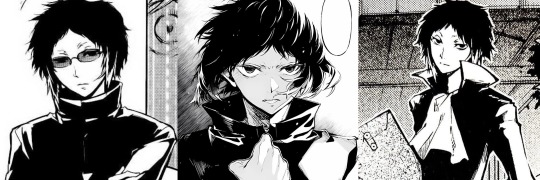
AKUTAGAWA RYUUNOSUKE
ISFP (The Adventurer / Composer ) - Fi > Se > Ni > Te
Akutagawa's dominant function, Introverted Feeling (Fi), reveals itself in his deeply personal sense of morality and the intense emotions that drive his actions. Although Akutagawa often appears cold and ruthless, his actions are motivated by a strong internal value system that he seldom reveals to others.
His need for validation, particularly from Dazai, is rooted in a profound sense of inadequacy and a desperate desire to prove his worth. This internal emotional landscape, characterized by Fi, defines Akutagawa’s motivations and underlies his quest for recognition, even as he grapples with feelings of rejection and worthlessness.
Next, we have Extraverted Sensing (Se), Akutagawa’s auxiliary function, which manifests in his acute awareness of his physical surroundings and his reactive combat style. Akutagawa thrives in high-pressure situations, where his ability, Rashomon, is wielded with precision and adaptability.
His Se drives him to engage with the world directly and immediately, making him a formidable force in battle. This function supports his Fi by allowing him to take swift and decisive action in pursuit of his personal goals, often leading to intense and violent encounters that are driven by his emotional undercurrents.
His tertiary function, Introverted Intuition (Ni), plays a subtler but significant role in his character. While Akutagawa is primarily focused on the present, there is a persistent sense of future orientation in his actions.
His Ni is evident in his long-term goal of gaining Dazai’s approval and the way he internalizes past experiences to guide his decisions. This function supports his Fi by giving him a sense of purpose and direction, even if it is often clouded by his immediate emotional responses.
Akutagawa’s Ni also manifests in his ability to foresee the consequences of his actions, though this is often secondary to his more dominant functions.
Lastly, Akutagawa’s inferior function, Extraverted Thinking (Te), is the least developed and manifests in his occasional struggle with logical organization and external structure. While Akutagawa can be strategic and methodical in battle, his approach is more often driven by his emotions and immediate sensory inputs rather than a clear, logical framework.
His Te surfaces when he attempts to impose order or efficiency in his environment, but these efforts are often overshadowed by his more dominant Fi and Se functions.
This inferior Te contributes to his difficulties in aligning his internal values with the external world, leading to a sense of frustration and conflict when his actions fail to achieve the desired results.
In conclusion, Akutagawa embodies the traits of an ISFP through his dominant Fi, which drives his intense emotional core and need for validation; his auxiliary Se, which fuels his reactive and physically engaging combat style; his tertiary Ni, which provides a sense of direction and future orientation; and his inferior Te, which occasionally struggles to impose order on his chaotic inner world.
His darling: ISFJ - Si > Fe > Ti > Ne
Or ENFJ - Fe > Si > Ne > Ti
ISFJ - (The Protector / Defender)
An ISFJ female darling would be the ideal match for Akutagawa, providing the stability, care, and emotional grounding that his turbulent ISFP personality craves.
Her dominant Introverted Sensing (Si) would offer Akutagawa a sense of continuity and reliability, something he deeply lacks in his chaotic life. Her ability to recall and value the past would help him feel anchored, offering him a safe emotional space where he can reflect on his experiences without feeling judged or misunderstood.
This grounding presence would counterbalance his reactive and intense Extraverted Sensing (Se), allowing him to find solace in a more structured, stable environment.
The ISFJ’s Extraverted Feeling (Fe) would complement Akutagawa’s deeply personal Introverted Feeling (Fi) by helping him navigate his emotions in a more outward, constructive manner. Her natural empathy and concern for others would provide him with the validation and understanding he seeks but often feels he doesn’t deserve.
Through her Fe, she would help Akutagawa express his feelings in a way that fosters connection rather than isolation, gradually teaching him that he is valued for who he is, not just for his abilities or his success in battle.
Her Introverted Thinking (Ti), while not as prominent, would provide a quiet, logical framework that could help Akutagawa make sense of his internal conflicts.
This function would assist in gently guiding him toward clearer, more structured thinking without overwhelming his emotional processes. Her Ti would act as a subtle but important counterbalance to his chaotic internal world, offering a perspective that is both patient and rational, helping him organize his thoughts and decisions more effectively.
Lastly, the ISFJ’s Extraverted Intuition (Ne), as her inferior function, would resonate with Akutagawa’s Introverted Intuition (Ni), fostering a mutual understanding of future possibilities and deeper meanings.
While her Ne is less developed, it would still complement his Ni by encouraging him to consider alternative perspectives and outcomes, subtly broadening his view without destabilizing his primary focus.
In summary, an ISFJ female darling would bring the stability, emotional support, and gentle guidance that Akutagawa desperately needs.
Her Si would provide grounding, her Fe would offer emotional understanding, her Ti would introduce subtle logic, and her Ne would complement his intuitive insights.
Together, these qualities would help Akutagawa find the balance and emotional connection he craves, making her the best possible match for him.
ENFJ (The Protagonist / Teacher):
An ENFJ female darling would be the second-best match for Akutagawa, offering him the emotional guidance and supportive leadership that could help him grow beyond his inner turmoil.
Her dominant Extraverted Feeling (Fe) would provide a nurturing and empathetic environment, allowing Akutagawa to feel understood and valued.
Her ability to connect with others on an emotional level would help him open up and express his feelings, easing his deep-seated need for validation and helping him navigate his intense Introverted Feeling (Fi) with more clarity and compassion.
The ENFJ’s Introverted Intuition (Ni) would align with Akutagawa’s own Ni, fostering a shared sense of purpose and vision. Her ability to see the bigger picture and understand the deeper implications of their actions would resonate with his need for meaning and direction.
This connection would help him focus his energy and emotions on long-term goals, providing a sense of purpose that extends beyond his immediate struggles.
Her Extraverted Sensing (Se), as her tertiary function, would complement Akutagawa’s auxiliary Se, encouraging him to engage more fully with the present moment.
While her Se is not as dominant, it would still offer a playful and dynamic energy that could help Akutagawa enjoy life’s experiences more openly and with less fear.
This would balance his sometimes overwhelming focus on immediate, intense sensory inputs, helping him approach situations with a bit more lightness and adaptability.
Lastly, the ENFJ’s Introverted Thinking (Ti), as her inferior function, would provide a subtle but important balance to Akutagawa’s chaotic internal world.
Though not her strongest function, her Ti would still offer a logical framework that could help him analyze situations more objectively. This would aid in softening the extremes of his Fi and Se, guiding him toward more balanced and thoughtful decision-making.
In summary, an ENFJ female darling would bring emotional warmth, shared vision, and a supportive, structured approach to Akutagawa’s life.
Her Fe would help him connect and express his emotions, her Ni would align with his sense of purpose, her Se would complement his present-focused intensity, and her Ti would offer subtle logical support.
Together, these qualities would help Akutagawa find emotional balance and a sense of belonging, making her an excellent match for him.
#bungou stray dogs#bsd#yandere bsd#bsd fyodor#bungou stray dogs fyodor#fyodor dostoevsky#fyodor dostoyevsky bsd#fyodor x you#dazai analysis#bungo stray dogs dazai#dazai#osamu x reader#dazai osamu#bsd chuuya x reader#bungo stray dogs chuuya#chuuya x reader#bsd chuuya#bungou stray dogs chuuya#chuuya nakahara#bsd analysis#bsd dazai#bsd nikolai gogol#bsd nikolai#bsd akutagawa#akutagawa ryuunosuke#mbti personalities#bsd mbti#mbti#MBTI analysis#bungou stray dogs dazai
234 notes
·
View notes
Text
*SPOILER WARNING CHAPTER 112*
Something is really off about Fyodor's death in the manga
Having just read the latest chapter, I noticed something really weird with Fyodor death scene. It all comes down to Dazai's reaction.
Before Fyodor "death" we see Dazai being all smug and gloating about what Fyodor missed, very typical of his character in general.
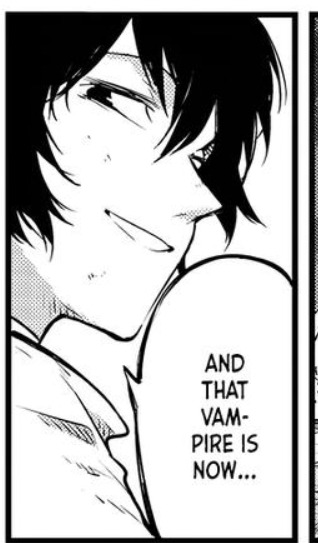
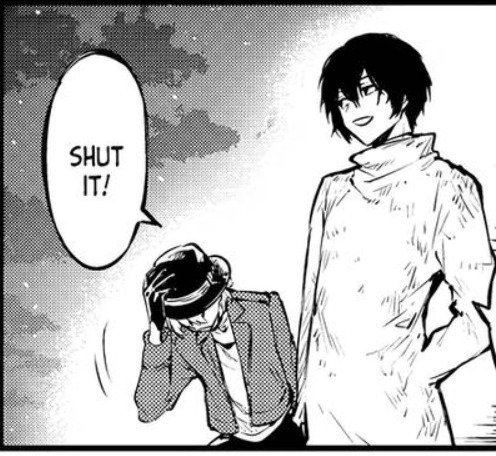
But then his mood suddenly shifts completely

He suddenly becomes very sombre, no triumph or gloating, this could be him regretting having to kill Fyodor, but the next few panels make me think there's more too it then that.
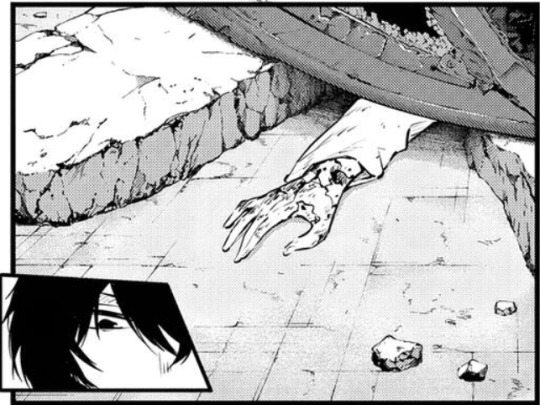
Look at Dazai's expression here, the way he seems so suspicious of the hand
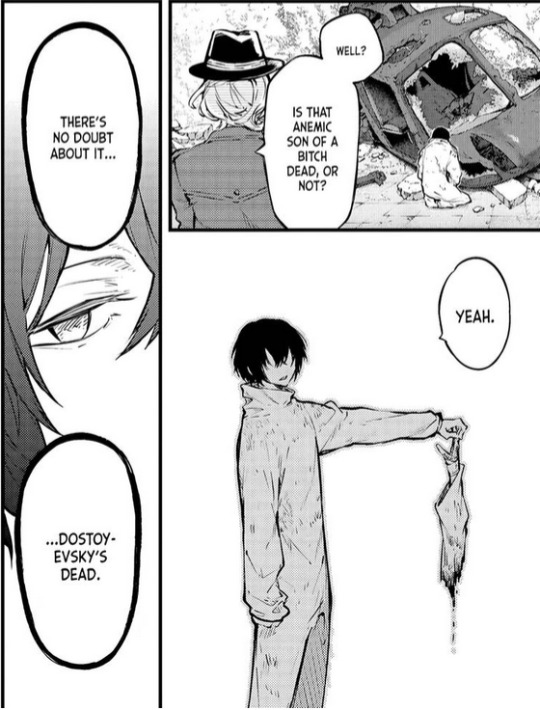
I don't think we've ever seen Dazai's eyes like this, they are blank white, it's almost like his mafia eyes but colour inverted. This is not the face of someone who just beat their greatest enemy, or someone mourning their loss, It looks like Dazai is unsatisfied, I can't quite describe it, but there is something more in those eyes.
After Fyodors death Dazai is uncharacteristically quiet and Chuuya even points it out, again, nothing about this says "we won!" it feels like we still lost somehow.
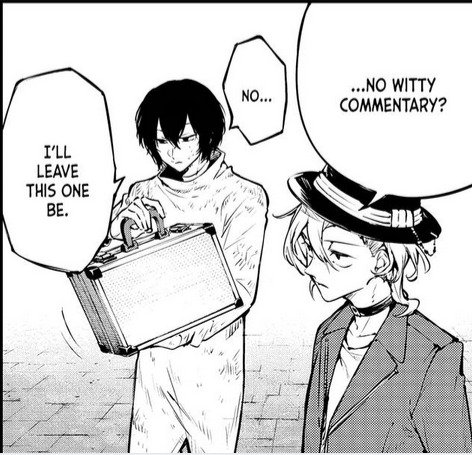
So why would Dazai not want Fyodor dead? While it could be because he was sad to lose the only person who thought like him, while that's possible, I want to explore another idea.
Death did not stop Fyodor.
Dazai could have killed Fyodor when he had him cornered in the cafe if he wanted to, or have someone else kill him so he doesn't break his promise to Oda.
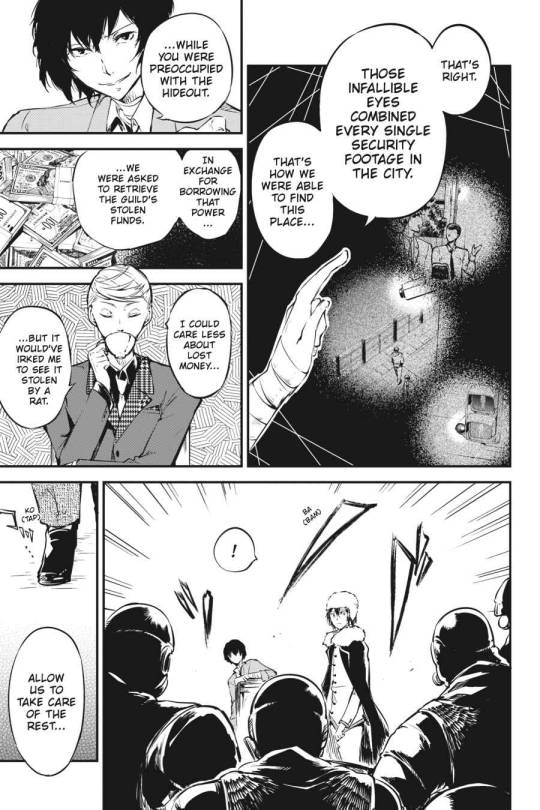
But he didn't, he let Ango arrest him instead, even though Dazai knew what a threat he was, why?
It all comes down to this.

The only way Dazai can counter Dostoyevsky is when he's right there in front of him. So now he's dead, Dazai can't read his actions any more. It's like he's fighting a ghost, all the plans Fyodor will have laid in case he died will be 10x harder to uncover and stop since it's much harder to fight an invisible enemy.
Remember that Dazai did not order the piolet to kill Fyodor, Bram did, and Dazai admitted to not having any say in that deal

.
I don't have any final point here, I just wanted to vent these thoughts. Does Fyodor quoting jesus on the cross mean he's going to come back in three days? What's going on with Sigma? I have way more questions than answers and it's driving me nuts
#bsd#bungou stray dogs#bungo stray dogs#bungou stray dogs dazai#dazai#bsd analysis#bungou stray dogs theory#fyodor bsd#fyodor dostoyevsky bsd#bungou stray dogs fyodor#bsd theory#bsd theories#bsd manga spoilers#bsd spoilers#bsd chapter 112
672 notes
·
View notes
Text
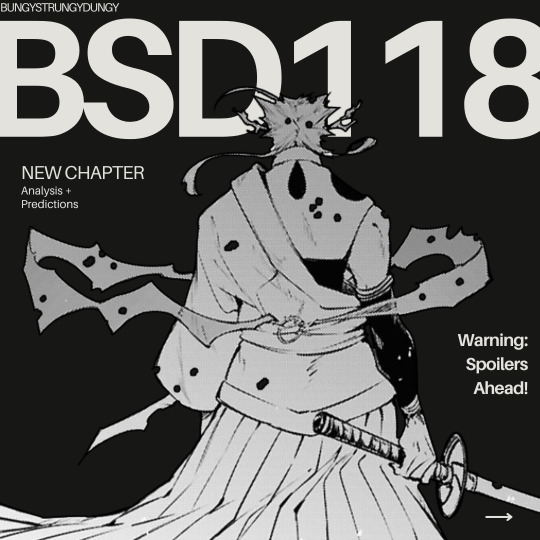
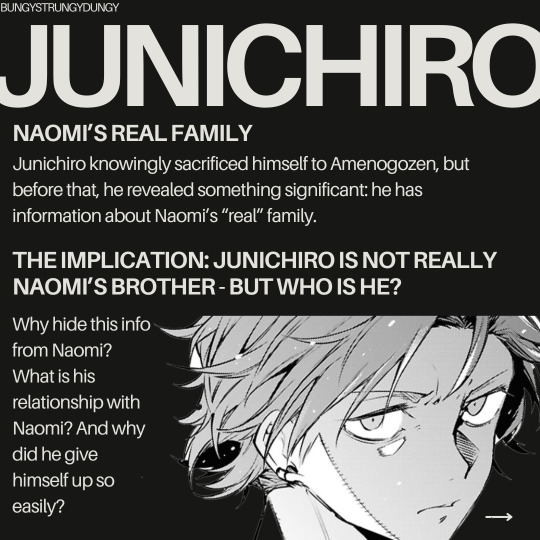
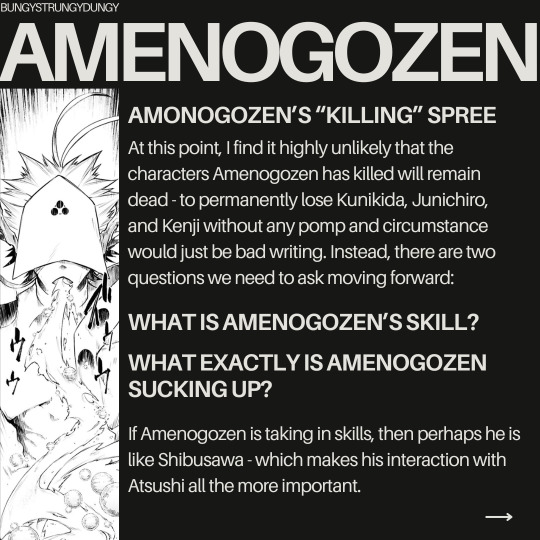
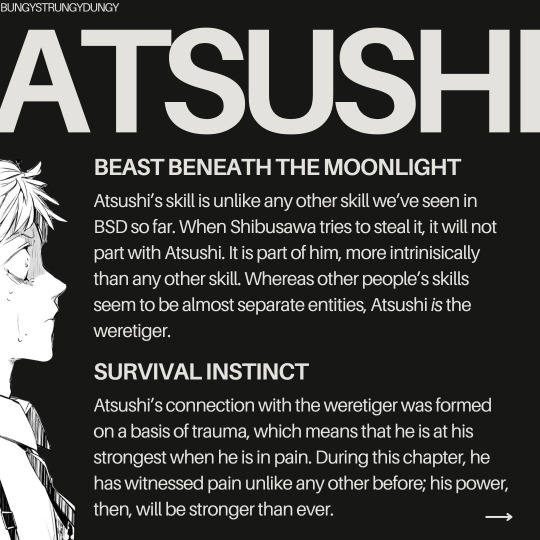
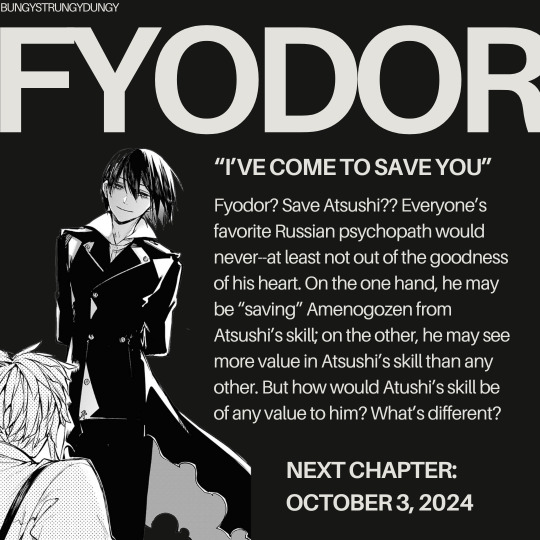
BSD 118 is out today!!! Please enjoy a lil analysis with some bonus predictions and questions. I’d love to hear your thoughts in the comments!!
#bungou stray dogs#bungo stray dogs#bsd#bsd 118#bungo stray dogs manga#bungou stray dogs manga#bsd manga#analysis#spoilers#junichiro#bsd junichiro#bsd atsushi#atsushi#atsushi nakajima#naomi tanizaki#tanizaki junichirou#bsd fyodor#fyodor dostoyevsky bsd#fyodor dostoevsky#bsd shibusawa
200 notes
·
View notes
Text
𝗗𝗼𝘀𝘁𝗼𝗲𝘃𝘀𝗸𝘆 𝗸𝗻𝗼𝘄𝘀 𝗵𝗲 𝗱𝗼𝗲𝘀𝗻'𝘁 𝗱𝗲𝘀𝗲𝗿𝘃𝗲 𝗯𝗲𝗮𝘁𝘆, 𝗯𝘂𝘁 𝗵𝗲 𝘀𝘁𝗶𝗹𝗹 𝗰𝗿𝗮𝘃𝗲𝘀 𝗶𝘁

Fyodor sees himself as hollow. The only thing that should fullfill him is faith, God, future visions. And yet, his mind, his flesh desires more than this.
Still, Fyodor doesn't see himself as an individual, but rather an instrument for Heaven's will.
Dostoevsky barely has any personal preferences and hides them well. The only consistent drive he is open about is a desire to be around beauty: classical music, delectable food, gorgeous people.
As if being around perfect and good-looking stuff can clench Fyodor's self-disgust.
Every time Dostoevsky is lavished with nice things, he feels like a rat, crawling into a royal palace. He doesn't deserve any of that. Not after everything that happened.
And yet, his little heart can't help but tremble every time someone gifts him an earthly pleasure: good wine, sweet tea, a peaceful atmosphere; people tending to him, surrounding him with all the comfort he needs. Fyodor can get addicted to it easily. But it never lasts.
There is a part deep inside of him that never relaxes, never gives into safety. Maybe, it's the part that ultimately broken or the one that belongs to God. It's restless and unstoppable.
Every time it wakes up, Fyodor's compulsion to save destroy the world takes over. Something triggers Dostoevsky, reminds him of his ability and he is back on his feet, searching for a way to fix everything.
Fyodor can never enjoy a good life for long enough. Every time he does, his drive drags him back into sewers,
where memories of peace
can only haunt him.
#feed the rat 🐀 but don't pet#he is too touch starved#he'll bite off your arm#bsd#bsd manga#bungou stray dogs#bungo stray dogs#bsd thoughts#fyodor Dostoevsky#Fyodor Dostoyevsky#fyodor Dostoevsky bsd#Fyodor Dostoyevsky bsd#Fyodor bsd#bsd Fyodor#Dostoevsky bsd#bsd Dostoevsky#fyodor headcanons#fyodor x reader#fyodor dostoevsky x reader#bsd analysis#bsd theories
149 notes
·
View notes
Text


Dostoevsky's and Dazai's religious ideologies were like complete opposites and I was all for it when working on The Gospel.
I would've totally dug deeper into Dostoevsky but I haven't finished Crime and Punishment yet so everything on Dostoevsky's end is from my research, if any of you have read Crime and Punishment (or any of his works really), let me know if Google was correct.
So I'm thinking the reason why The Gospel is 130 whatever pages is because I'm digging in on an individual level, and then like I'm like also writing this as if someone doesn't know the entire plot of BSD. Well, ok, that was more necessary for like 15, Stormbringer, and the Dragon Head Incident just cause not everyone has read those, but I'm also using the manga for this analysis and I've noticed some differences between the anime and the manga so I'm coming across scenes that like I wasn't even aware of in the Prison Arc.
Also I try to differentiate when I'm talking about the real life author by calling the actual author by their last name out of respect and calling the anime character by their first name. So like with Fyodor I refer to the anime character as Fyodor but the author as Dostoevsky in my analysis. That's kinda hard to do with Dazai though so...you guys are just gonna have to figure out when I'm talking about real life Dazai and anime Dazai...sorry.
Anyway, quick update, enjoy these crumbs because I do have finals coming up so I won't be able to work as much as I want to on this. Progress will be slow and/or come to a complete halt in the next few weeks, but once I am free it is going to be WRITING time lemme tell you.
I'm about done with the Prison Arc, just covered Chuuya killing Dazai yesterday. Literally had to research the impact of bullet wounds in the shoulder thank you Chuuya. Then after that I actually plan on redoing the 15 arc completely just because my writing style really developed over the course of this analysis and I want to match that. Then onto proofreading and finalizing.
#bsd dazai#bungou stray dogs#dazai osamu#bsd#bungo stray dogs#bungou stray dogs dazai#bungo stray dogs dazai#bsd chuuya#chuuya nakahara#analysis#fyodor bsd#fyodor dostoyevsky bsd#fyodor dostoevsky#bsd fyodor#bungou stray dogs fyodor#bungou stray dogs chuuya#skk#soukoku
48 notes
·
View notes
Text
First time posting my analyses here !!! It’s Fyodors cultural representation & symbolism in general !
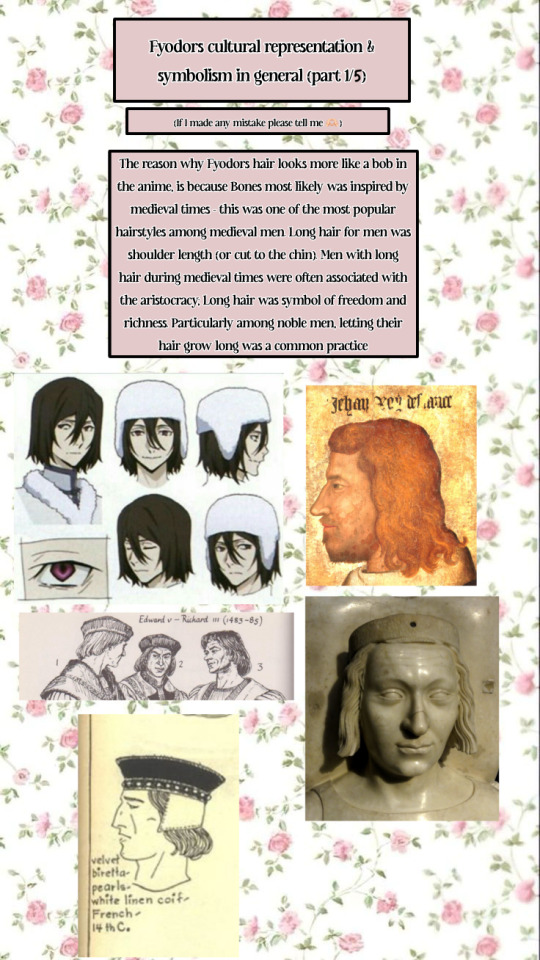
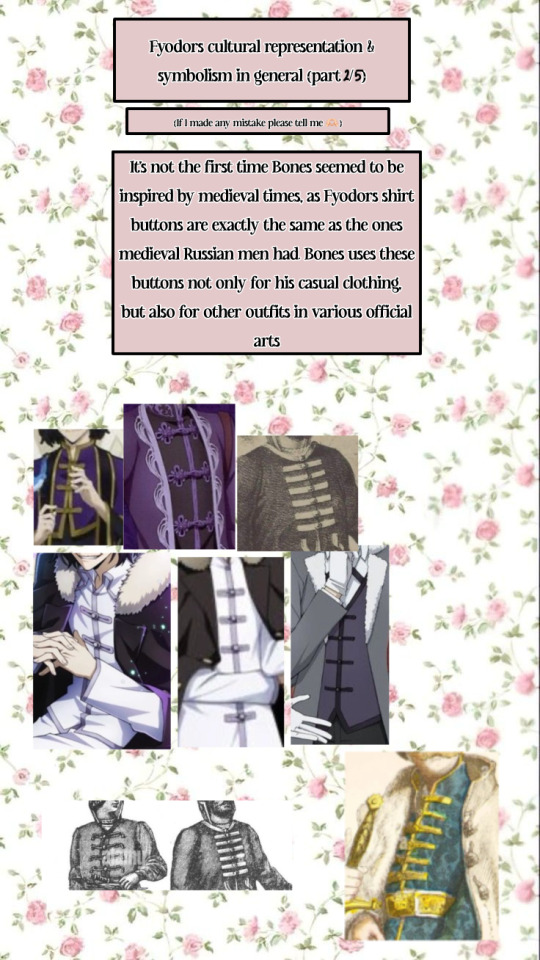
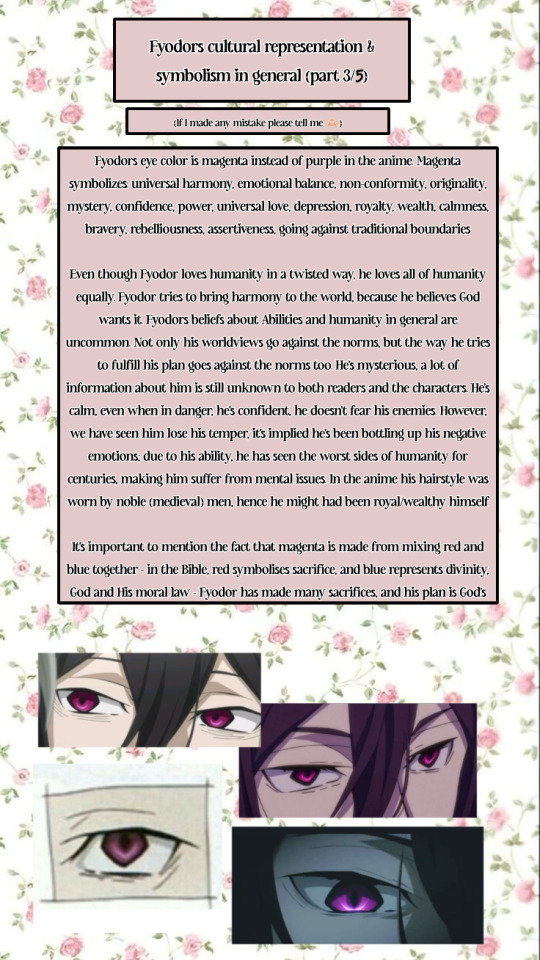
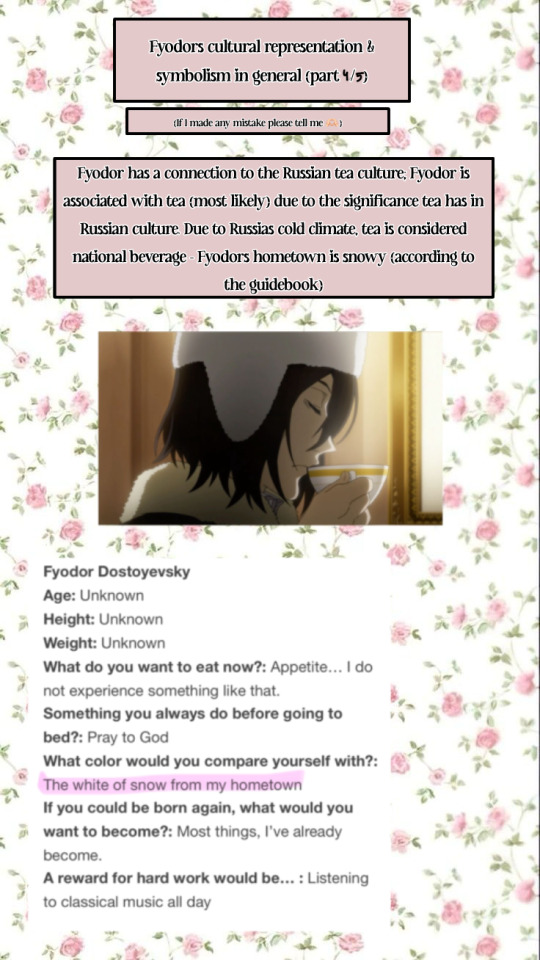
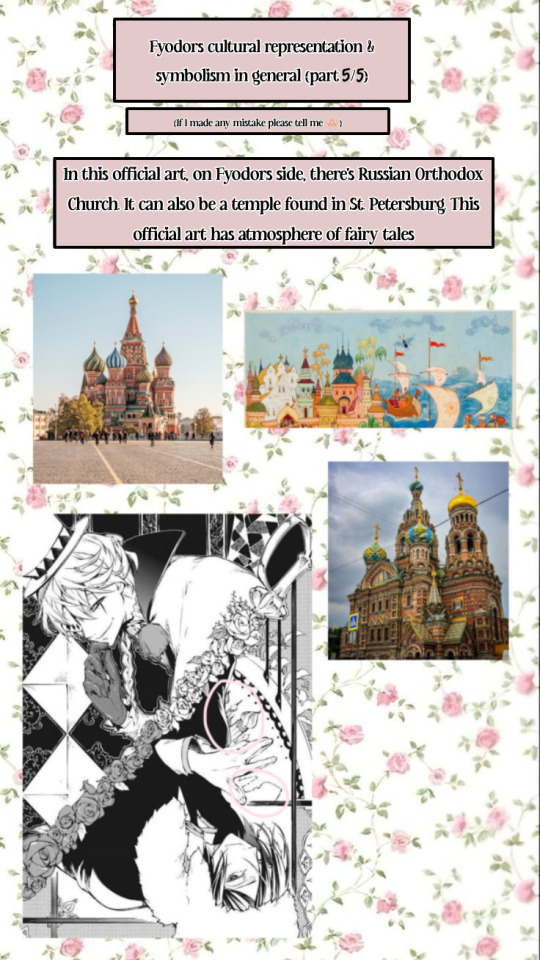
#bsd#fyodor dostoyevsky bsd#bsd fyodor#bungou stray dogs fyodor#fyodor dostoevsky#fyodor dostoyevsky#fyodor dostoevsky bsd#fyodor#bungou stray dogs#character analysis
50 notes
·
View notes
Text
The irony of Fyodor's words:
These words have always stuck with me when I started to reread the manga, especially with the recent chapters and Fyodor's behavior. He says something deeply philosophical, but also deeply ironic.
In the anime, he says:
“People are eager to believe that they are acting with free will. That they know best. They become so excited by their own discoveries that they give them too much value. We all loathe to believe we can be controlled.” (Season 3, Episode 4, 17:35)
And in the manga:

"People, honestly, simply, wrongly assume that 'I thought so myself.'" (Vol. 10, Ch. 42, Page 35)

At first glance, these two quotes seem to say something very similar—that people tend to overvalue their own thoughts and discoveries, believing them to be entirely their own, when in reality, they might be influenced by something (or someone) else. But here's where the irony kicks in: Fyodor himself embodies this very mindset.
Despite his belief that people are wrong to assume their thoughts are independent, Fyodor operates under the assumption that his philosophy is entirely his own. In truth, it’s shaped by a lifetime of suffering, trauma, and a near-obsessive need to control the world around him.
Fyodor’s theory—that all ability users should be eradicated—is rooted in his own experiences of feeling powerless and out of control. The abuse he’s endured, combined with his ability, has led him to view the world—and its "free will"—as fundamentally flawed. He believes that to restore order to this chaotic world, the gifted must be suppressed. Yet, isn't this philosophy itself an example of the very thing he criticizes in others? His conviction that he has discovered the "truth" mirrors the self-deception he critiques: the tendency to believe that his thoughts are purely his own, unaffected by external forces, including his trauma.
In a way, Fyodor is trapped in the very mindset he warns against: the idea that his conclusions are logical and independent, when they are actually the product of his suffering, his obsession with control, and his refusal to accept the chaos of human nature. His belief that he’s arrived at the ultimate truth—that ability users must be eradicated to prevent chaos—reflects the same misguided, self-affirming belief that he accuses others of having.
Fyodor, in his isolation and intellectual torment, has convinced himself that eradicating others' abilities is the only way to restore order. But this "discovery" is not a product of pure intellect. It is, instead, the result of his trauma and distorted worldview. The irony is that he has become the very thing he despises: someone who clings to his own belief as the ultimate truth, dismissing the possibility that his thoughts are shaped by his personal history, his suffering, and his need for control.
At the heart of this contradiction is Fyodor’s desperate desire for control. His philosophy isn't just intellectual; it’s emotionally driven, born of his experiences with powerlessness. In seeking to rid the world of chaos and disorder, he longs for a sense of security. But he fails to see that his quest for control is itself a response to his internalized trauma. His attempts to impose order are shaped not just by logic, but by his scars.
This leads us to the central irony: Fyodor cannot see that his belief system is flawed not because it's illogical, but because it’s emotionally driven. He claims to have transcended the emotional influence of others, yet in doing so, he becomes a prisoner of his own narrative. He cannot escape the fact that his thoughts, like those of the people he criticizes, are shaped by his fears, desires, and personal history.
Fyodor's rejection of external influence is, in the end, a perfect reflection of the flaw he exhibits: the inability to recognize that his thoughts are not independent, but deeply shaped by a lifetime of suffering and a need for control. He believes that he has arrived at the ultimate truth through intellectual reasoning, but in reality, his philosophy is just as much a product of his internal struggles as anyone else’s beliefs.

Thank you for coming to my Ted Talk :>
Dividers: saradika-graphics
#bsd#bungou stray dogs#bsd fyodor#bsd fyodor dostoevsky#fyodor bsd#bungo stray dogs fyodor#bsd analysis#fyodor dostoyevsky bsd
93 notes
·
View notes
Text
I've thought about Yosano and Fyodor's possible interactions so much actually. If they ever met directly it would be fascinating.
Fyodor is a reminder to Yosano of all those soldiers she was forced to heal. His life is utterly disrespected by his ability, taking away his right to die. He's just forced to go on and on fighting like they did. Except, unlike them, he won't escape when she leaves or dies, because it's his own ability torturing him.
On the flip side, Yosano would solidify Fyodor's goals. If he intends to destroy abilities, the case of a young girl forced to participate in war, healing soldiers endlessly, forcing others to go through the same pain he has to, would remind him of the supposed evil of abilities.
Hell, seeing another power like hers own could even convince Yosano herself that abilities should go, or at least shake her faith in fighting against Fyodor. I doubt she'd ever agree with his methods, but if it was down to the two of them, and there were no lives she could save by fighting him...
When he goes to write that last command in the page, and destroy abilities forever, she might just offer him a pen.
#you have no idea how many fics of them i have planned bro#bsd#bungo stray dogs#bungou stray dogs#bungou stray dogs analysis#bsd analysis#bsd theory#bsd theories#bsd fyodor#fyodor dostoyevsky bsd#bsd yosano#akiko yosano bsd#fyosano
31 notes
·
View notes
Text
Fyodor will live theory
uhhh late theory
Let’s talk first about his resemblance and references to Christianity and Jesus.
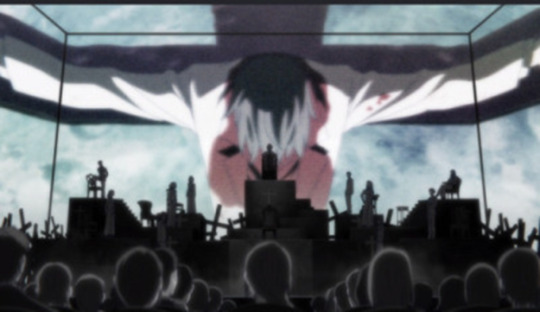
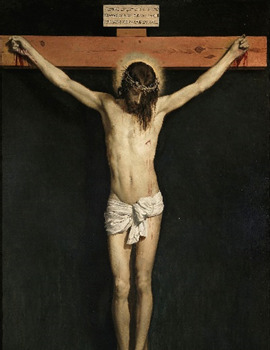
This is obviously Fyodor, however the season in which these pics where from was the 4th season, in the episode 2. This was a great parallelism to Jesus before dying, a LOT of people watching and Jesus being on the cross, and with Fyodor it is the SAME, only difference being that 1- it was Fyodor instead of Jesus and 2- Fyodor has clothes (specifically of the prison).
Into the next similarity to Jesus and reference to Christianity
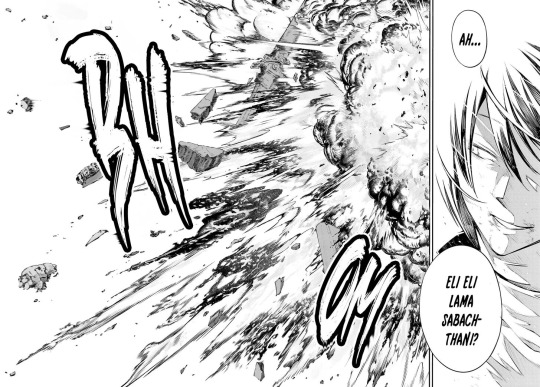

In this scene, he says the same thing Jesus did before dying in Mark 15:34 and Matthew 27:46.
Let’s also talk about how he thinks of himself as a ‘God-sent’ while Jesus is literally God-sent, and both Jesus and Fyodor are shown as somehow cruel or bad because of God (Jesus refused to heal someone, Jesus engaged in a long harangue against the scribes and pharisee and he also used a whip of braided cords and drove merchants and money lenders out of the outer courtyard of the temple. Fyodor does things that in other’s eyes can be considered as cruel or bad but in his eyes everything he does is good and in the name of God.)
Let’s go now to the theory itself why Fyodor is alive,
In this official art, Fyodor has his arm hidden and it’s the SAME arm where he got his hand hurt and the SAME arm that he was took away by Dazai.
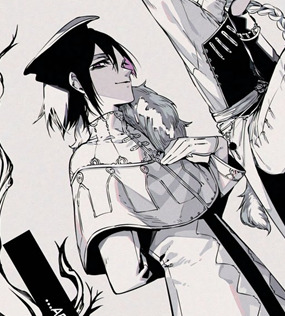
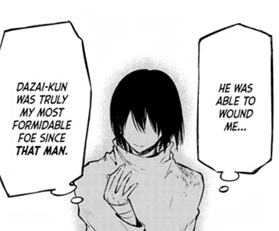

Fyodor’s backstory still hasn’t been revealed, and in the chapter 111, he says that Dazai was his most formidable foe since that man, which could mean Fyodor getting a backstory finally.

In this scene, which is in the untold origins of the agency, Fyodor appears crucified in his prison clothes and with the wounds that he got in chapter 111 of the manga and episode 11 of s5, however he doesn’t appear without one of his arms, which was supposedly took away by Dazai.
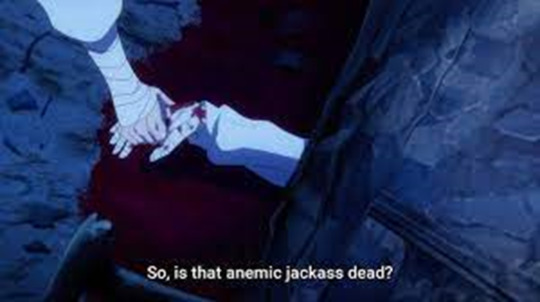
In this scene, Fyodor’s arm got off a bit too easily, which shouldn’t be like that since even though he got crushed by a rock, it wouldn’t make sense for it to come off that easily.
Let’s also talk about his out of character things.
Fyodor chooses to not take the antidote before going into the helicopter, which is out of character asf because if he is going to die in less than 15 or even 10 minutes the most logical thing to do would be to take the antidote as fast as possible, not to go to the helicopter and take the antidote inside.
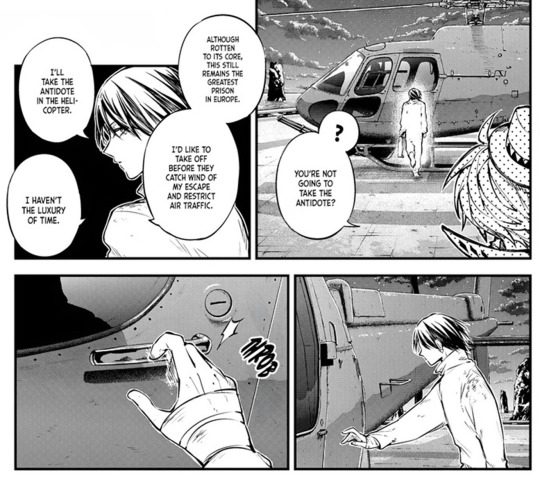
Let’s also talk about Chuuya’s acting, because even though Fyodor did look surprised, there is no way he actually fell for it, for this we have to go to the Ace vs Fyodor chapter.
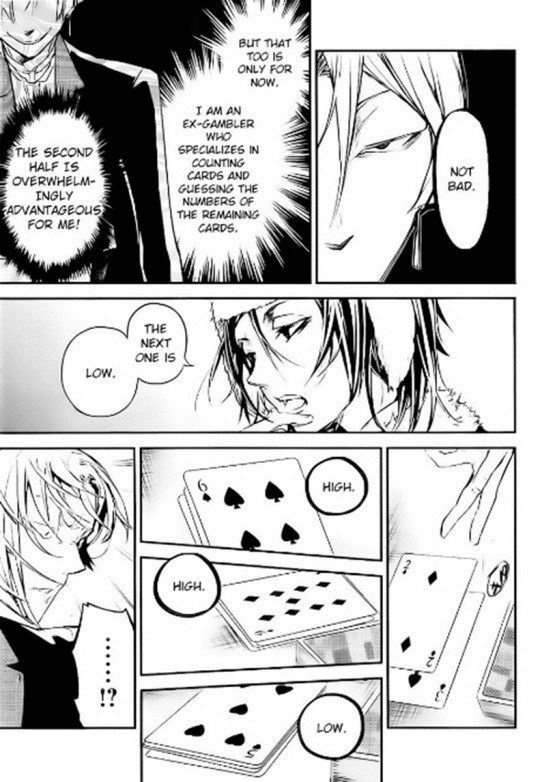
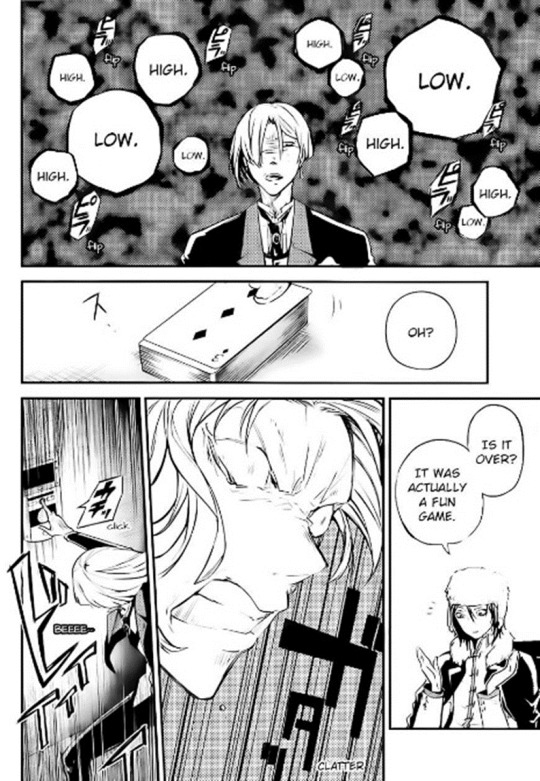
Fyodor led Ace to believe that he had a space/consciousness controller ability, Fyodor memorized the scratches of each single card, which made him won, not to mention, he had seen how Ace was listening to his conversation with Karma, which is why he lied and he himself gave false information to the one who kidnapped him, and what was it all for? To get the secrets of the pm executives and even the boss himself. He even drove Ace to kill himself, which was a pm executive and also a very intelligent man. So, how could Fyodor fall for Chuuya’s act? Let’s go to why he probably didn’t believe Chuuya’s act.
First of all, Chuuya’s skin isn’t the same as the other vampires, let’s compare Chuuya’s skin to Akutagawa’s one.

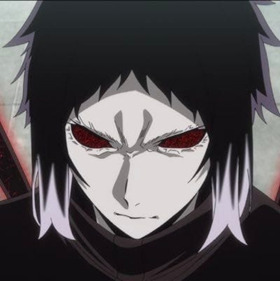
See the difference? Even though in canon Chuuya is a good actor, there are different things, one being his costume for the act to the act itself, and let’s admit that the act itself wasn’t that great, he grabbed his hat under the water, he putted his hands on his waist when walking and even when not.
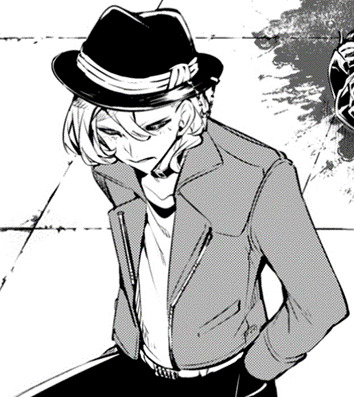
When Chuuya was walking Fyodor should have known that it wasn’t a vampire because he was using vampires to communicate to the exterior.
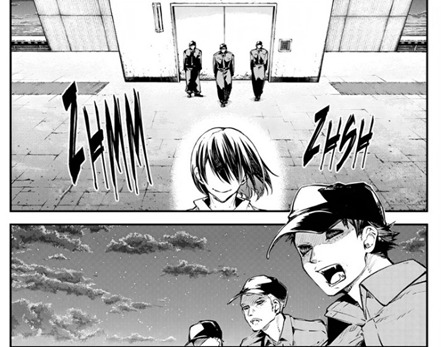
Dazai's reaction is also weird, the expression he has is definitely not one would have after defeating a enemy, his expression is unsure, doubtable, and even going out of his expression, the way he speaks isn't his usual self, and even chuuya notices
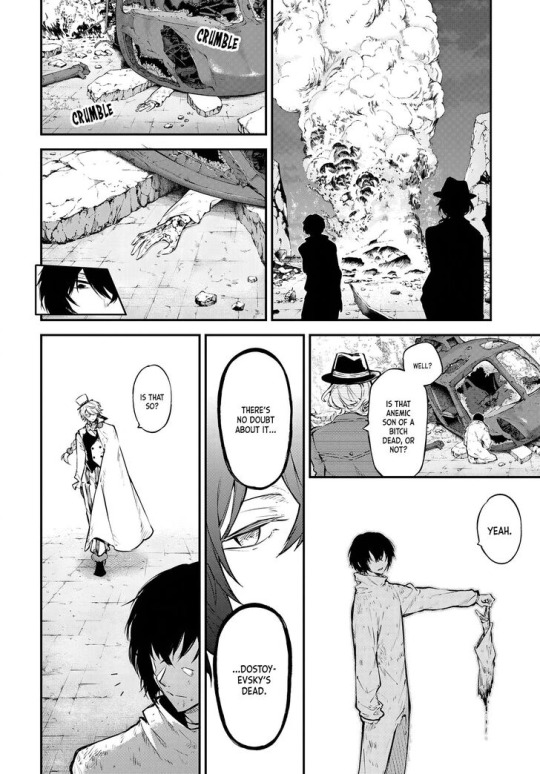
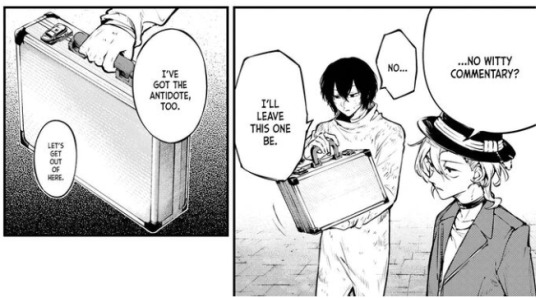
Having took all those facts he probably didn’t believe Chuuya’s act despite him supposedly being surprised when he saw Chuuya again, and I say supposedly because it could have been an act considering how he got sigma to believe his act.
Let’s also mention that Fyodor ‘commanded’ Chuuya to kill Dazai when there wasn’t really any need, because Fyodor could have just escaped after letting Sigma unconscious and let Dazai die from either the poison or just bled out, he knew that if Dazai got to touch Chuuya, Chuuya ‘wouldn’t’ be on Fyodor’s side anymore, which can actually mean that he knew Chuuya wasn’t a vampire, not to mention he looks VERY confident that Dazai would be dead.
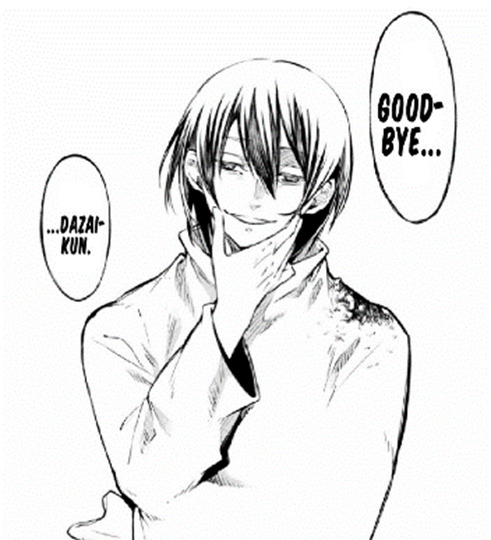
So, what does this bring us to? Fyodor faked his death, but why and what other proves are there for this conclusion? His arm got off too easily and his ‘corpse’ was never shown AT ALL, Fyodor is a very smart man so there is absolutely NO WAY he is dead when 1- his backstory hasn’t been showed, 2-it would be very abrupt to kill Fyodor and lastly, 3- it wouldn’t make sense.
Thank you for reading! I hope you enjoyed this theory
#bsd#bsd analysis#bungou stray dogs#chuuya bsd#chuuya nakahara#chuuya analysis#not really lol#dazai#bsd dazai#bungou stray dogs dazai#dazai analysis#fyodor dostoyevsky analysis#bsd fyodor dostoevsky#fyodor analysis#bsd fyodor#fyodor dostoyevsky bsd#fyodor dostoevsky#fyodor will live#literary stray dogs
27 notes
·
View notes
Text
Dostoevsky's Disgust: Could It Be His Downfall?
‼️WARNING: SPOILERS AHEAD FOR BSD 119‼️
Fyodor's reaction of pure disgust to Atsushi's indisputably honorable willingness for self-sacrifice just fascinated me in this latest chapter.
Fyodor Dostoevsky presents himself as this saintly villain, this tortured genius messiah who makes sacrifices nobody but he can comprehend the need for in order to benefit all of humanity in the grand scheme of things. And we're tempted to buy into that - especially those of us who are Dostoevsky readers. We're familiar with the Russian author's "dark mysticism", his thoughts on universal, active love and how it moves everything, thus lighting up a corrupt and suffering Earth.
But this Fyodor? He has been around for far too long to still be himself. This theory of mine plays into what we know about his ability. Crime and Punishment has "ship of Theseus"d him so much (and from the way he retains Bram's prerogative to protect Aya, we KNOW each body he takes over leaves its mark on him). He has been doing this for hundreds of years. Theseus has blown through hundreds of ships. Could anyone's individuality survive that, at least uncorrupted? Don't think so.
What's truly got me wondering is whether Fyodor is aware of this loss of self he has undergone (haha, No Longer Human parallels!) or if he genuinely thinks he is still that savior, that authentically Dostoyevskian lover of mankind. Let's look at it this way:
"Greater love hath no man than this, that a man lay down his life for his friends."
That's John 15:13 (KJV translation).
Fyodor claims to follow God, right? His ideology is a Christianist brand of Nietzschean terrorism, of course, but he should at least be in agreement with one of the most iconic Biblical teachings, shouldn't he? He should admire the "great love" of a human being laying down their life for their friends.
THAT'S EXACTLY WHAT HE HAS ATSUSHI DO. THAT'S EXACTLY WHAT ATSUSHI DOES. Immediately, zero hesitation, just pure sincerity and desperation.

And how does Fyodor respond?

"Ewwwww not you giving me the ick rn"
The people he seems to like - or actually, let's use the word "respect", since after this, I don't know if Fyodor is still capable of love - are those with the most twisted morals. People who will kill and torture for him regardless of whether it tears them apart inside or not (Nikolai). People he perceives as apathetic, amoral and scheming (Dazai).
I hope this philosophical phenomenon doubles as narrative/conflictual foreshadowing. Fyodor has lost the battle of ideas; this is fatal for a villain motivated by faith. He has already defeated himself on the inside.
I hope all his lies and betrayals come back to finish him.
THANKS FOR READING 🫶💝🦋
#bsd meta#bsd#bungou stray dogs#bsd fyodor#fyodor dostoyevsky bsd#fyodor bsd#fyodor dostoevsky#dostoevsky bsd#bsd atsushi#atsushi bsd#bsd analysis#bsd 119#calugaritsa original
96 notes
·
View notes
Text
I was rereading the manga and I just realised this.
Fyodor, Fitzgerald and Agatha have been working together since the beginning
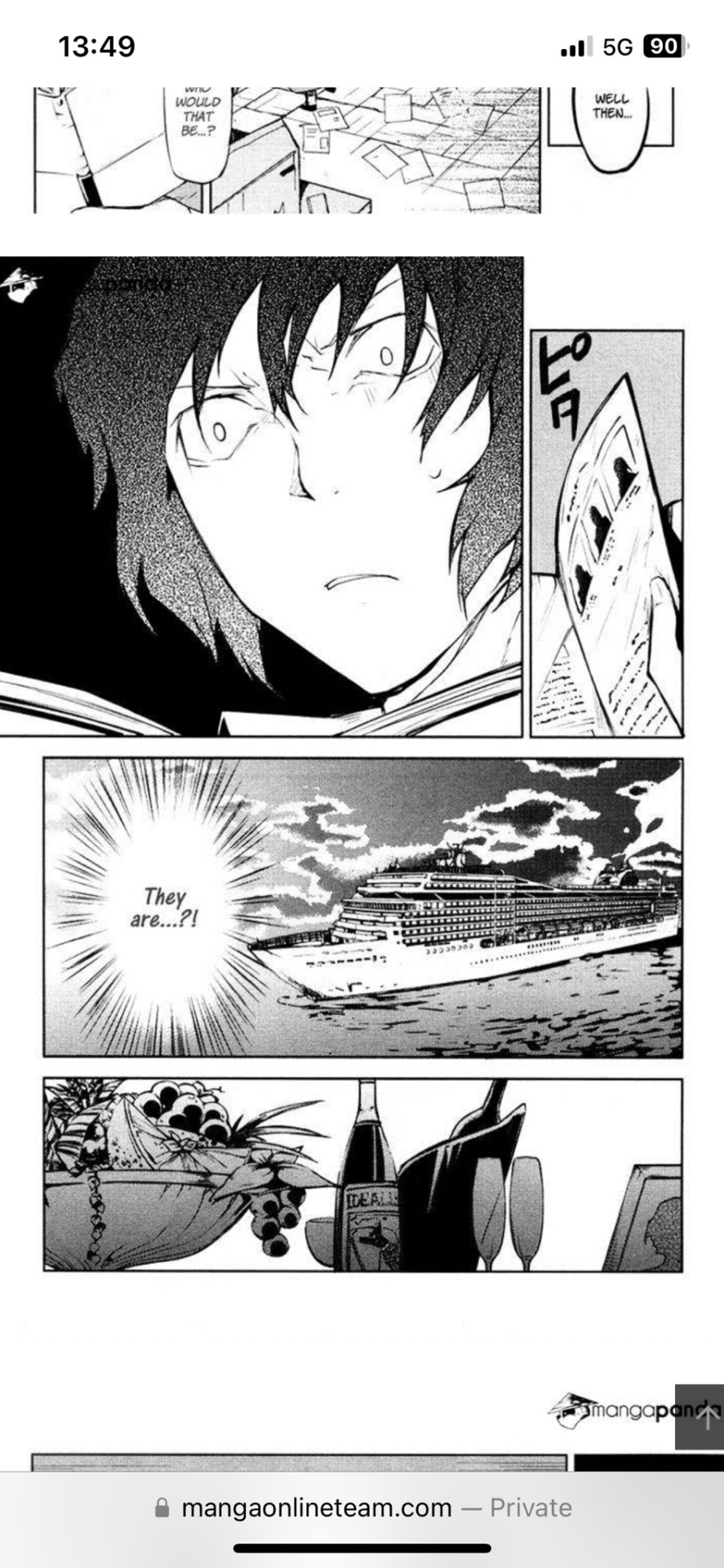
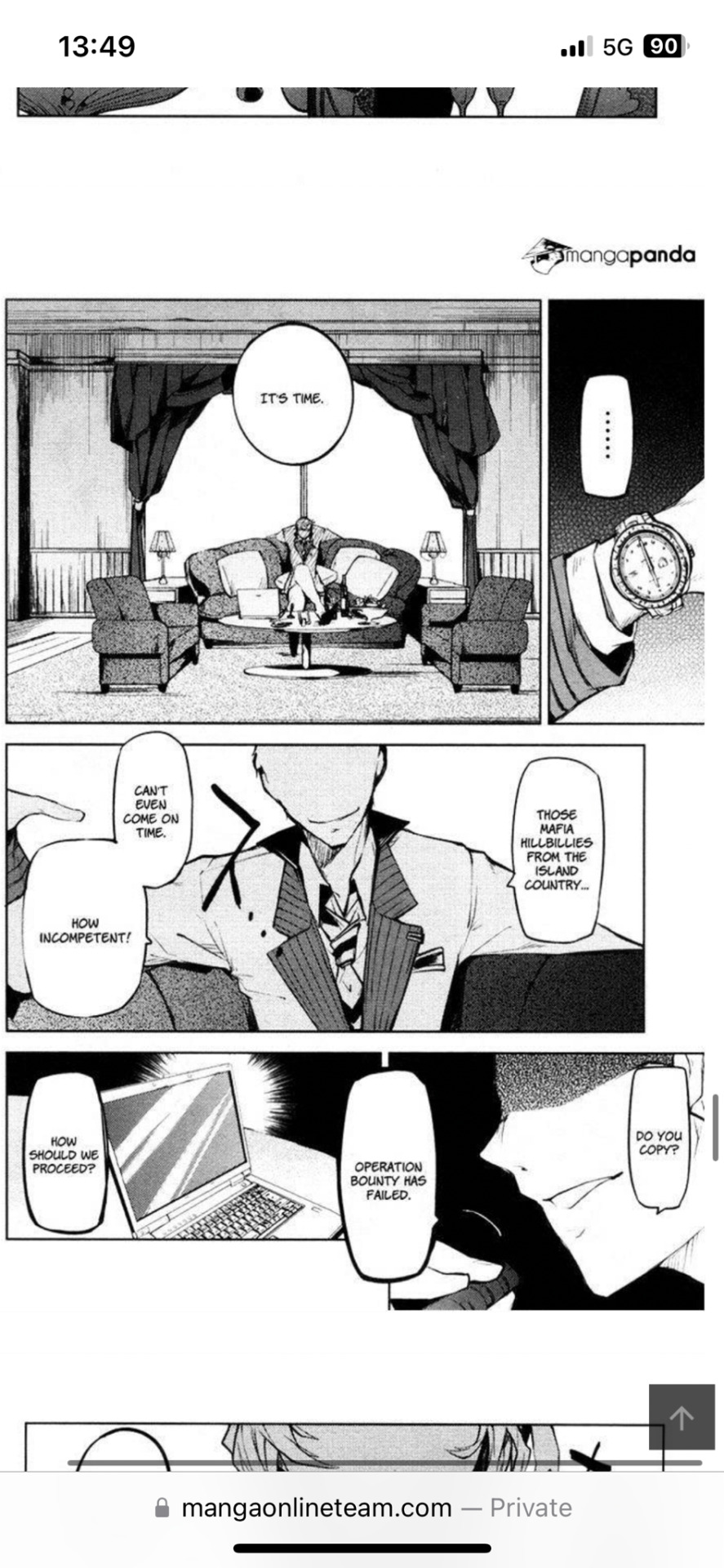
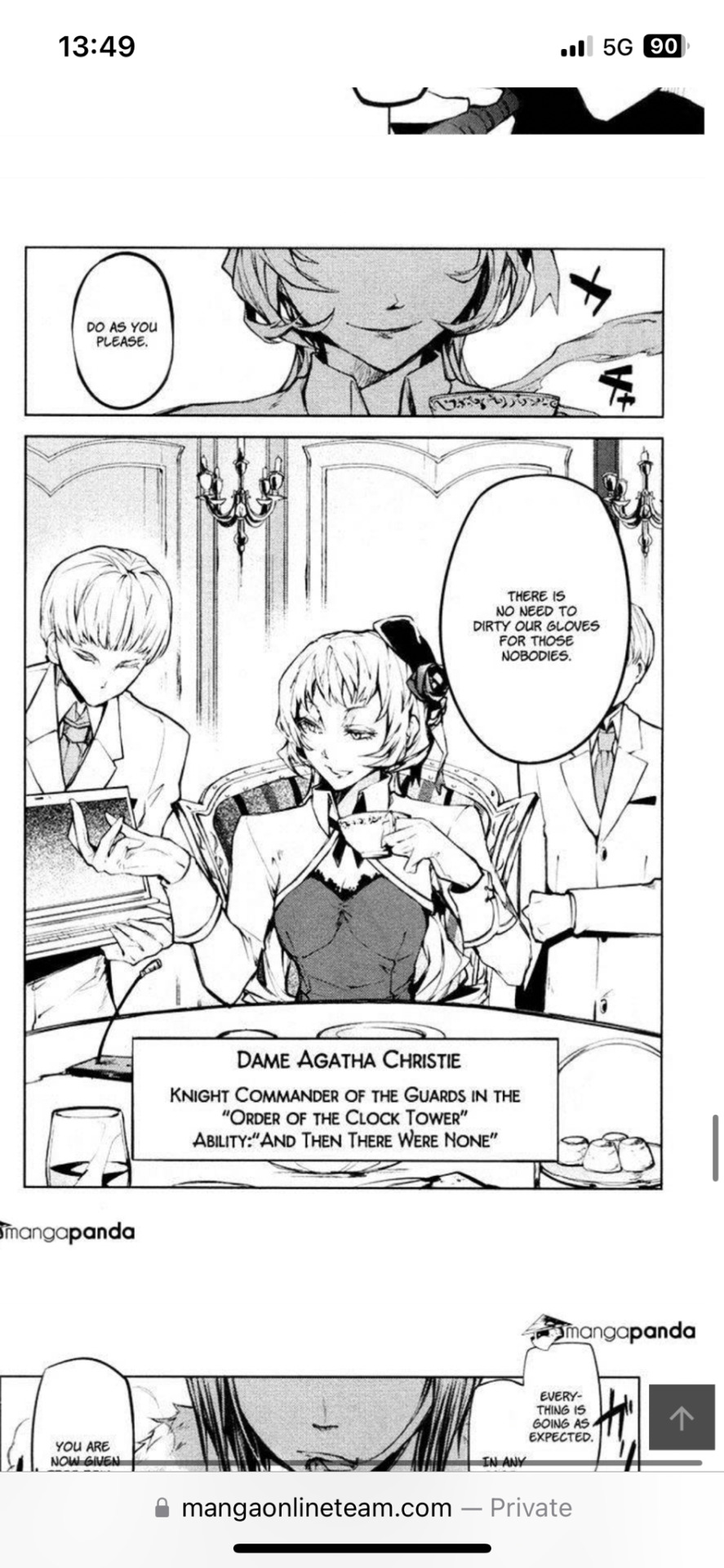
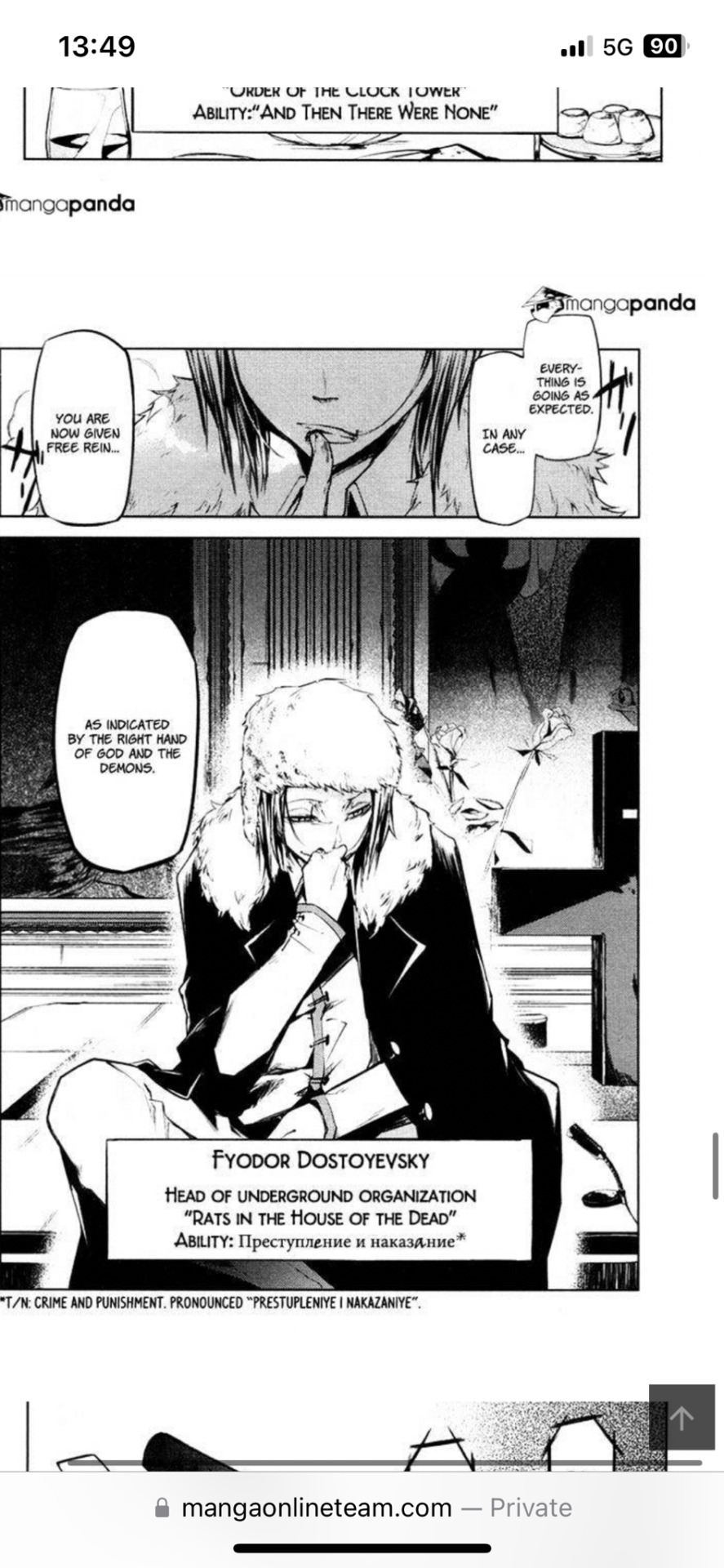
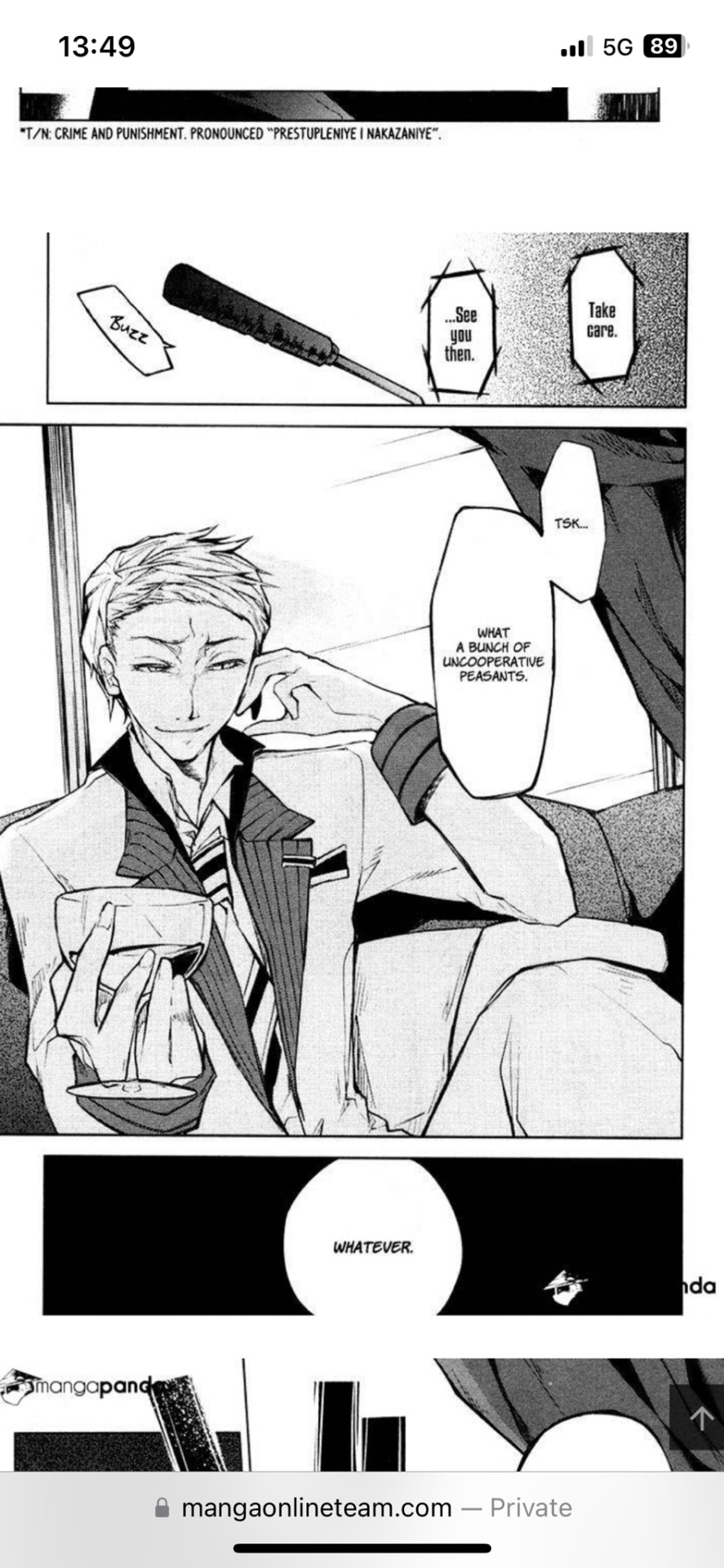
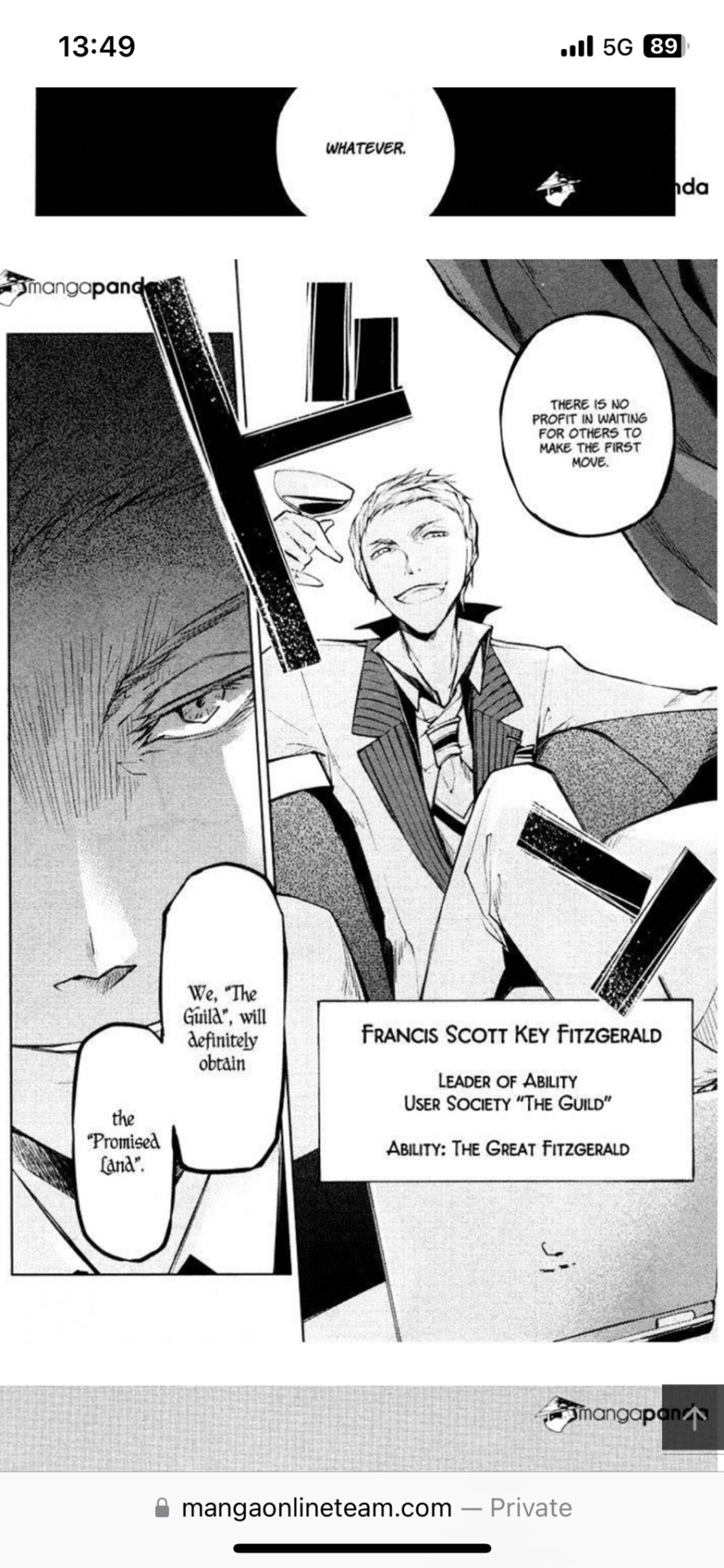
I have no idea what this will mean for future chapters, but Agatha next villain confirmed?
#bsd#bsd fyodor#bsd theories#bsd theory#bungou stray dogs#fyodor bsd#fyodor dostoevsky#fyodor dostoyevsky bsd#bsd analysis#bsd fitzgerald#agatha christie#bsd agatha
80 notes
·
View notes
Note
BSD men's attachment styles? What do you think they would be? (The ones you write for ofc)
Hello, my dear!♥️ Thank you for the request.♥️

BSD MEN x attachment styles
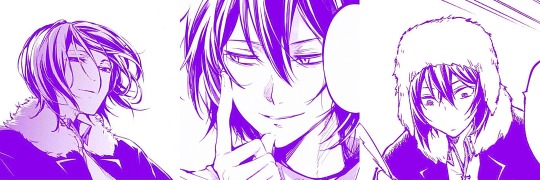
Fyodor Dostoevsky
He might show a Fearful-Avoidant attachment style.
His need for control and strategic detachment, combined with the deep emotional bonds he forms with a select few (like his darling or his daughter), aligns with this style.
His complex, manipulative nature and tendency to create chaos suggest he has deep-seated fears about intimacy and trust, leading him to oscillate between seeking control and distancing himself from others.
However, with a stable, loving relationship where he feels truly safe and understood, his Fearful-Avoidant attachment style could transform into a Secure style.
Over time, positive emotional experiences and trust could help him release his fears and embrace a more balanced and secure approach to intimacy.

Dazai Osamu
He likely exhibits a Fearful-Avoidant attachment style.
His self-destructive tendencies, emotional detachment, and reluctance to form genuine connections suggest he struggles with intimacy while simultaneously seeking it.
His oscillation between self-destructiveness and deep emotional connections reflects a fear of vulnerability and dependence.
However, if Dazai were to experience a stable, loving relationship where he feels safe and accepted, his Fearful-Avoidant style could shift towards a Secure attachment style.
Through consistent emotional support and trust, his fears of intimacy could lessen, allowing him to form healthier, more stable bonds.
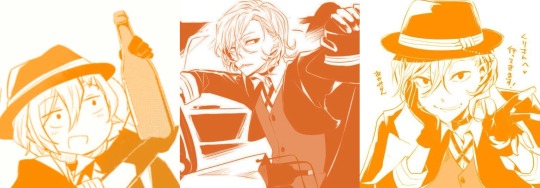
Nakahara Chuuya
With his fierce independence and complex relationships, he might lean towards an Avoidant attachment style.
His tendency to suppress emotions and difficulty in fully opening up to others align with traits associated with avoidance of intimacy.
However, there is a strong possibility that once he experiences a loving, established secure relationship, his attachment style could shift towards Fearful-Avoidant, as the deeper emotions and vulnerabilities that arise may trigger underlying fears of closeness and rejection.
However, with consistent emotional support and a stable, loving bond, this Fearful-Avoidant style could eventually transform into a Secure attachment.
Through positive experiences that build trust and comfort with intimacy, his initial fears of closeness could diminish, allowing him to feel secure and confident in his relationships.

Nikolai Gogol
His wish to eliminate his own “friend” to escape his emotions reflects a significant struggle with intimacy and vulnerability.
This suggests a Fearful-Avoidant attachment style. He desires freedom from emotional constraints but simultaneously experiences intense inner conflict, which often characterizes this attachment style.
His view of emotions as a cage aligns with the Fearful-Avoidant tendency to both crave and avoid closeness.

Akutagawa Ryuunosuke
With intense emotional responses, a need for validation, high sensitivity to perceived threats to his status, and difficulty maintaining stable relationships, he likely exhibits an Anxious attachment style.
His strong desire for closeness, coupled with fears of inadequacy and rejection, aligns with the traits of anxious attachment, particularly his sensitivity to rejection and constant need for acknowledgment.
#bsd#bungou stray dogs#bungo stray dogs x reader#bsd fyodor#bungou stray dogs fyodor#fyodor dostoyevsky bsd#fyodor dostoevsky#yandere bsd#fyodor x reader#fyodor x you#dazai analysis#dazai scenarios
179 notes
·
View notes
Text
Fyodor and the Devil: Analysis of Fyodor's motives and role in the narrative
Asagiri has stated that he based Fyodor not on Dostoyevsky the author but on a specific scene from one of his books The Brothers Karamazov where Ivan Karamazov confronts “the devil” in his room.

(It's a really good book, you should read it if you have time. Also. fun fact, Fyodor and the devil wear the same hat, “His soft fluffy white hat was out of keeping with the season.”)
Having read the book and gone over this scene, I realized that this could be used to find out a lot more about Fyodor as a character than we see in the story, including a potential glimpse at his real motivations.
A bit of context for the scene. Ivan Kramazov is a clever but deeply trouble man who has struggling with the concept of God and rationalising him with the cruelty of humanity, at one point while very sick, Ivan starts seeing a man in his room who claims to be “the devil”. Their conversation is a fascinating look at morality and why evil exists in the world, and if you look at it closely it reveals a lot about the role of a “villain” in a story.
This line from “the devil” is really interesting to me, and seems to explain a lot about Fyodor’s character, as well as align perfectly with how Asagiri has described Fyodor in interviews:
Before time was, by some decree which I could never make out, I
was predestined 'to deny' and yet I am genuinely good-hearted and not at all inclined to negation.
'No, you must go and deny, without denial there's no criticism and what would a journal be without a column of criticism?'
Without criticism it would be nothing but one 'hosannah.' But nothing but hosannah is not enough for life, the hosannah must be tried in the crucible of doubt and so on, in the same style. But I don't meddle in that, I didn't create it, I am not answerable for it. Well, they've chosen their scapegoat, they've made me write the column of criticism and so life was made possible.
Basically the devil is saying that he was created because without evil then good means nothing, if everything was perfect then nothing would happen or change, life couldn’t exist, so he was forced to be that evil even though he never wanted to be.
This is so similar to how Fyodor is described in the BSD exposition 2020:
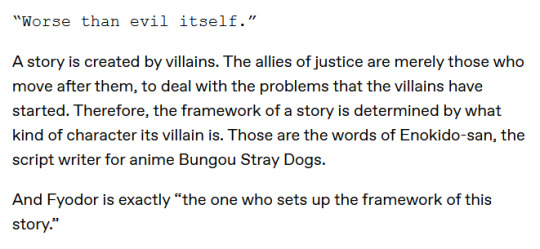
Fyodor is the antagonist, he is the villain of the story, that is the role he plays. This explains why he chooses to commit so many atrocities in the name of “following God's plan”. It even connects to his line in The Dead Apple, and his ability name. He is both crime and punishment, as “crime” or sin originates with the devil, but it's also the devil who punishes sinners.
(I mean the title of the episode he is introduced in is literally “My Ill Deeds Are the Work of God” by committing evil acts he is fulfilling God's purpose for him.)
And if Fyodor is really based on “the devil” it's very likely he also either does or used to wish for release from this role that was assigned to him, but he knows that he cannot stray from his path or the story will cease to exist. My evidence for Fyodor wanting to be free of his mission is just one interaction, when he kills Karma.
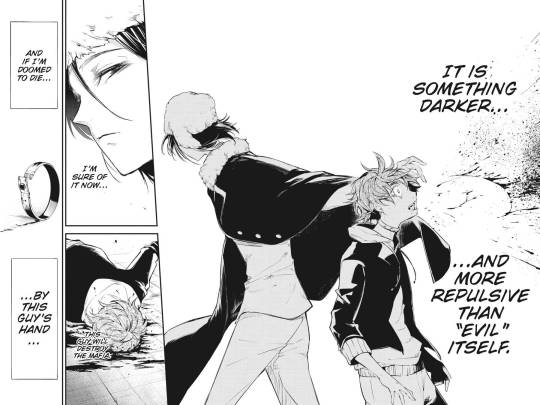
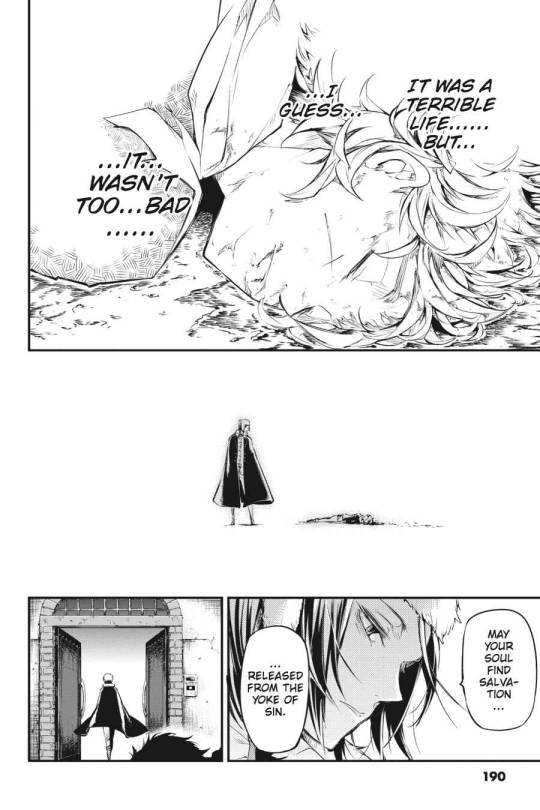
Look at Fyodor's expression here, this is the only time in the entire series where we see him look truly sad. This isn't an act, there is no one there for him to trick, he simply says a quiet prayer for the life of a boy who's only purpose was to suffer and die.
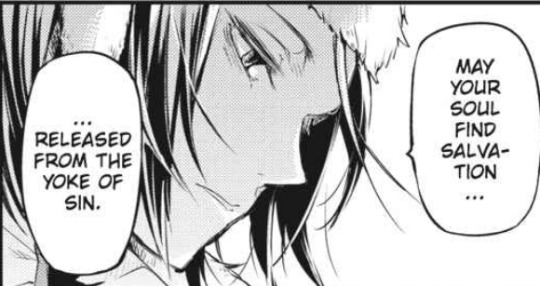
This next part of “the devils” speech actually seems to fit very well for Dazai, it's interesting since he is the narrative foil to Fyodor and clearly is a very similar character.
We understand that comedy; I, for instance, simply ask for annihilation. No, live, I am told, for there'd be nothing without you.
If everything in the universe were sensible, nothing would happen. There would be no events without you, and there must be events. So against the grain I serve to produce events and do what's irrational because I am commanded to.
For all their indisputable intelligence,men take this farce as something serious, and that is their tragedy. They suffer, of course... but then they live, they live a real life, not a fantastic one, for suffering is life. Without suffering what would be the pleasure of it? It would be transformed into an endless church service; it would be holy, but tedious. But what about me? I suffer, but still, I don't live. I am x in an indeterminate equation. I am a sort of phantom in life who has lost all beginning and end, and who has even forgotten his own name.
This ties perfectly into Dazai and Fyodor’s debate on the nature of God in the sky casino arc.



Dazai here points out that it's not perfection and harmony that make the world move, it's the irrational, it's the foolishness and stupidity of humans who charges into life making a million mistakes but always finding ways to fight on through it. Here Dazai and Fyodor represent the conflicting sides of “the devil” with Fyodor embodying his mission to drive the world and Dazai embodying his secret love for, and wish to join, humanity.
“I love men genuinely, I've been greatly calumniated! Here when I stay withyou from time to time, my life gains a kind of reality and that's what I like most of all. Yousee, like you, I suffer from the fantastic and so I love the realism of earth. Here, with you, everything is circumscribed, here all is formulated and geometrical, while we have nothing but indeterminate equations! I wander about here dreaming. I like dreaming. Besides, on earth I become superstitious. Please don't laugh, that's just what I like, to become superstitious. I adopt all your habits here: I've grown fond of going to the public baths, would you believe it?
And I go and steam myself with merchants and priests. What I dream of is becoming incarnate once for all and irrevocably in the form of some merchant's wife weighing eighteen stone, and of believing all she believes. My ideal is to go to church and offer a candle in simple-hearted faith, upon my word it is. Then there would be an end to my sufferings.”
“"Why not, if I sometimes put on fleshly form? I put on fleshly form and I take the consequences. Satan sum et nihil humanum a me alienum puto."*
* I am Satan, and deem nothing human alien to me.”
This piece from the devil feels like it could be a description of Dazai’s character, his wish above all else to find happiness and love as a human despite believing he is a demon. Both Dazai and Fyodor have strong ties to the Devil, both of them are often described as demonic or inhuman, with emphasis placed on the darkness of their souls and the isolation they feel due to their minds.
But the difference between them is how they dealt with it, Fyodor chose to embrace it and fully commit to his role in the story as the ultimate evil for the greater good, but Dazai has always shown a fasciation with humans and has spent his life trying to connect to them and find meaning in his existence.
Finally, let's look at what we can learn about Fyodor’s motivation. Fyodor is the villain, he is the final obstacle the protagonist has to overcome, he is the driving force behind so much of Atsushi’s life and the reason so much of the series has played out at all. He sent Shibusawa to torture Atsushi as a child, he was an informant to the guild who put the bounty on Atsushi making the mafia turn on him, he was involved in the guild invasion, and obviously he was the master mind behind cannibalism and Decay of Angles.
If he is aware of his position as the antagonist, then he also is probably aware Atsushi is the protagonist, he knew he was the “envy of all ability users” after all, so he knows Atsushi has some significance to the world as a whole.
Atsushi is also the “guide to the book” which is seemingly Fyodor’s end goal, so even though Fyodor doesn’t seem to be focused on Atsushi, he has been indirectly influencing his whole journey up to this point. This also explains why Fyodor is only moving actively now, because the protagonist has appeared and his role as the villain can finally be fulfilled and he, like “the devil” can finally get the “annihilation” he asked for. Hence, Fyodor’s true goal is to erase himself from the narrative.
There is actually quite a lot of evidence for this. The obvious part is that Fyodor wants to rid the world of ability users while he himself is an ability user, he cannot exist in his perfect world.
Then there’s the fact that in the Dead Apple, Fyodor calls himself “crime” if Fyodor is “crime” or “sin” then a world free of sin would not contain him at all
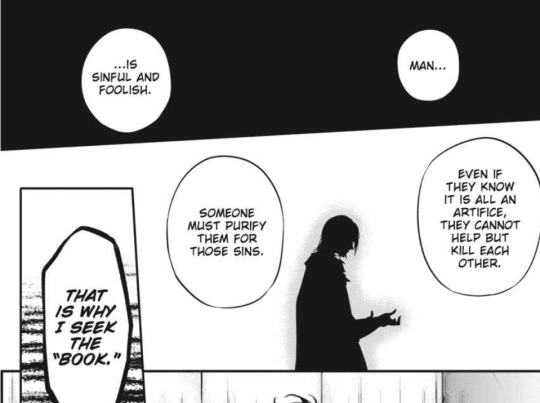
Even when Fyodor talks about sin, he says how humans are easily manipulated into killing each other, while he constantly manipulates characters into killing each other, he is the cause of the sin he fights.
A really strong bit of evidence is this interview with Asagiri and Harukawa
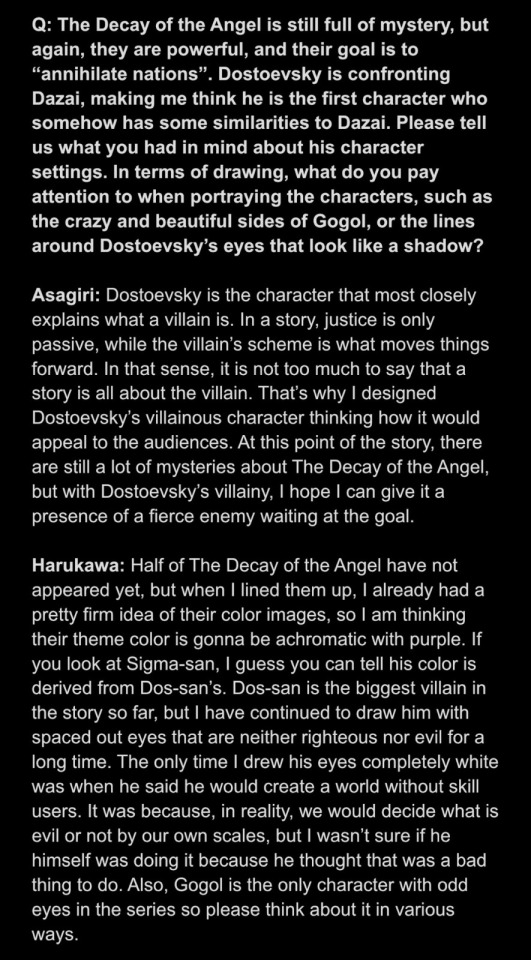
Not only does Asagiri reiterate Fyodors role as the person who moves the story, Harukawa specifically mentions that Fyodor might be trying to create a world without ability users because he thought it was a “bad thing to do” aka the action a villain would take that would lead to a hero stopping them.
“Dos-san is the biggest villain in the story so far, but I have continued to draw him with spaced out eyes that are neither righteous nor evil for a long time. The only time I drew his eyes completely white was when he said he would create a world without skill users. It was because, in reality, we would decide what is evil or not by our own scales, but I wasn't sure if he himself was doing it because he thought that was a bad thing to do.”
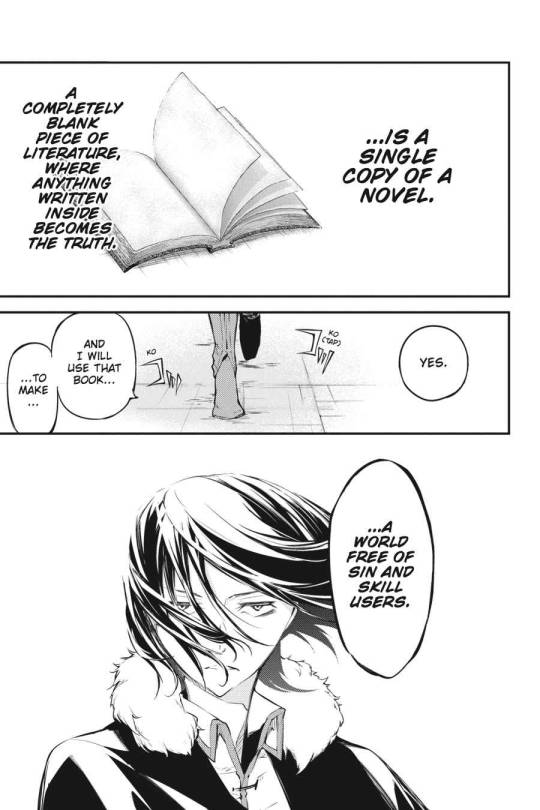
This also connects to how Fyodor was able to understand Gogol when no one else could, Gogol is chooses to fight against the way the world is to prove to himself that he truly is free. Fyodor, who is bound to play a part in a narrative, would understand that feeling and that longing to be truly free.
To be clear, I don’t think that Fyodor is really a good person whose just been trapped in an awful position against his will, we see many times that Fyodor revels in his cruelty and enjoys killing and torturing others. Its the same with “the devil” in the book, although he hates the job he was given, he tells Ivan stories of the people he’s corrupted and seems very proud of himself for it.
My personal interpretation is that the sadistic zelot personality Fyodor displays is a mixture of a mask and a coping mechanism, kind of similar to Yosano developing a sadistic side to help her deal with the guilt of half killing people in order to heal them. I think it makes sense that after centuries of cruelty and manipulation a person would become detached and stop really caring about the lives he destroys.
This analysis is partially unfinshed but I wanted to post it now and see what other people think of it.
#bsd#bungou stray dogs#bungo stray dogs#fyodor bungou stray dogs#fyodor bsd#fyodor dostoyevsky bsd#fyodor dostoevsky#bsd fyodor#bsd fyodor dostoevsky#bsd dostoevsky#bungou stray dogs theory#bsd theory#bsd theories#character analysis#media analysis#bsd analysis#bungou stray dogs analysis#bsd manga spoilers#bsd manga#bsd dazai osamu#bsd dazai#the brothers karamazov
381 notes
·
View notes